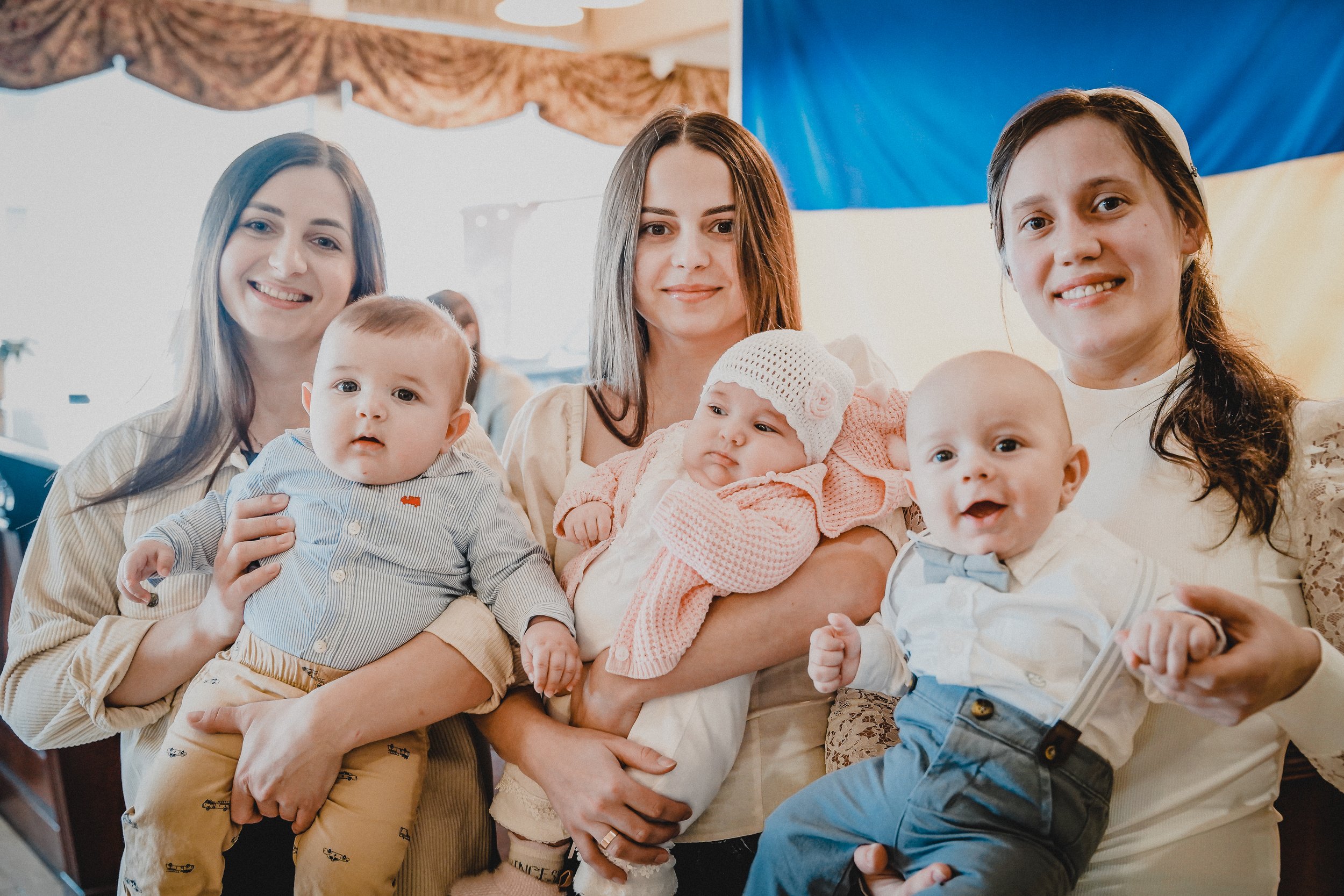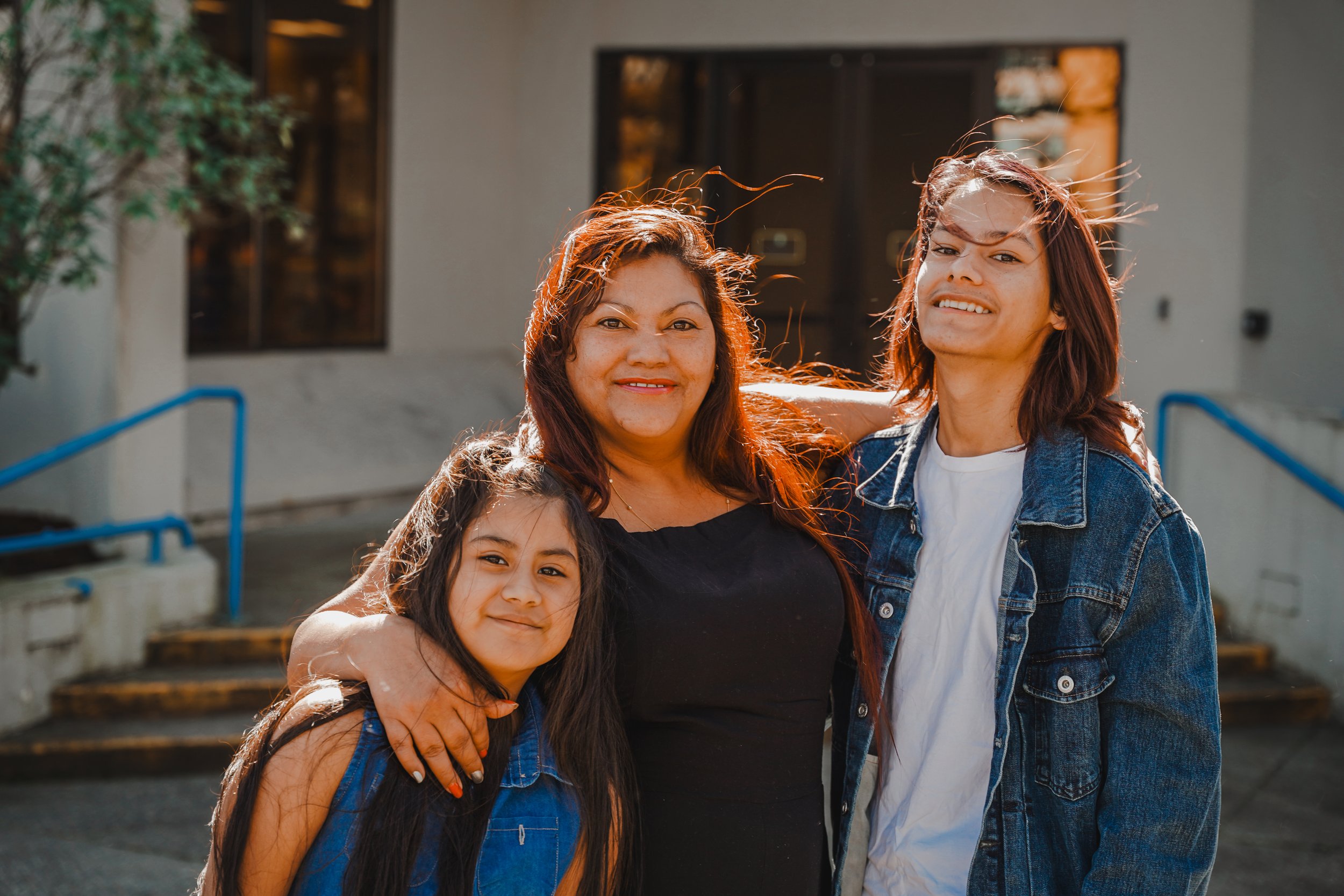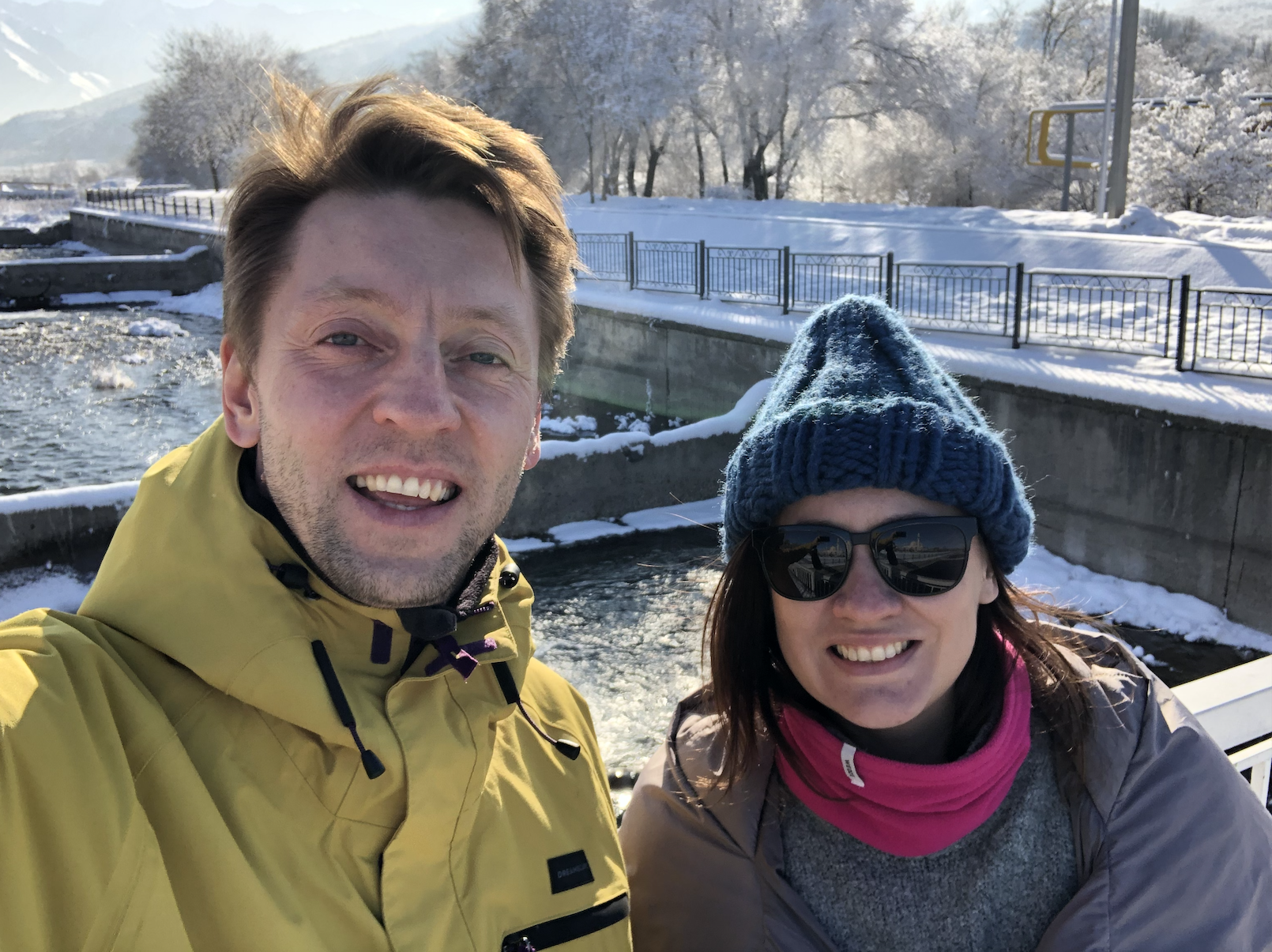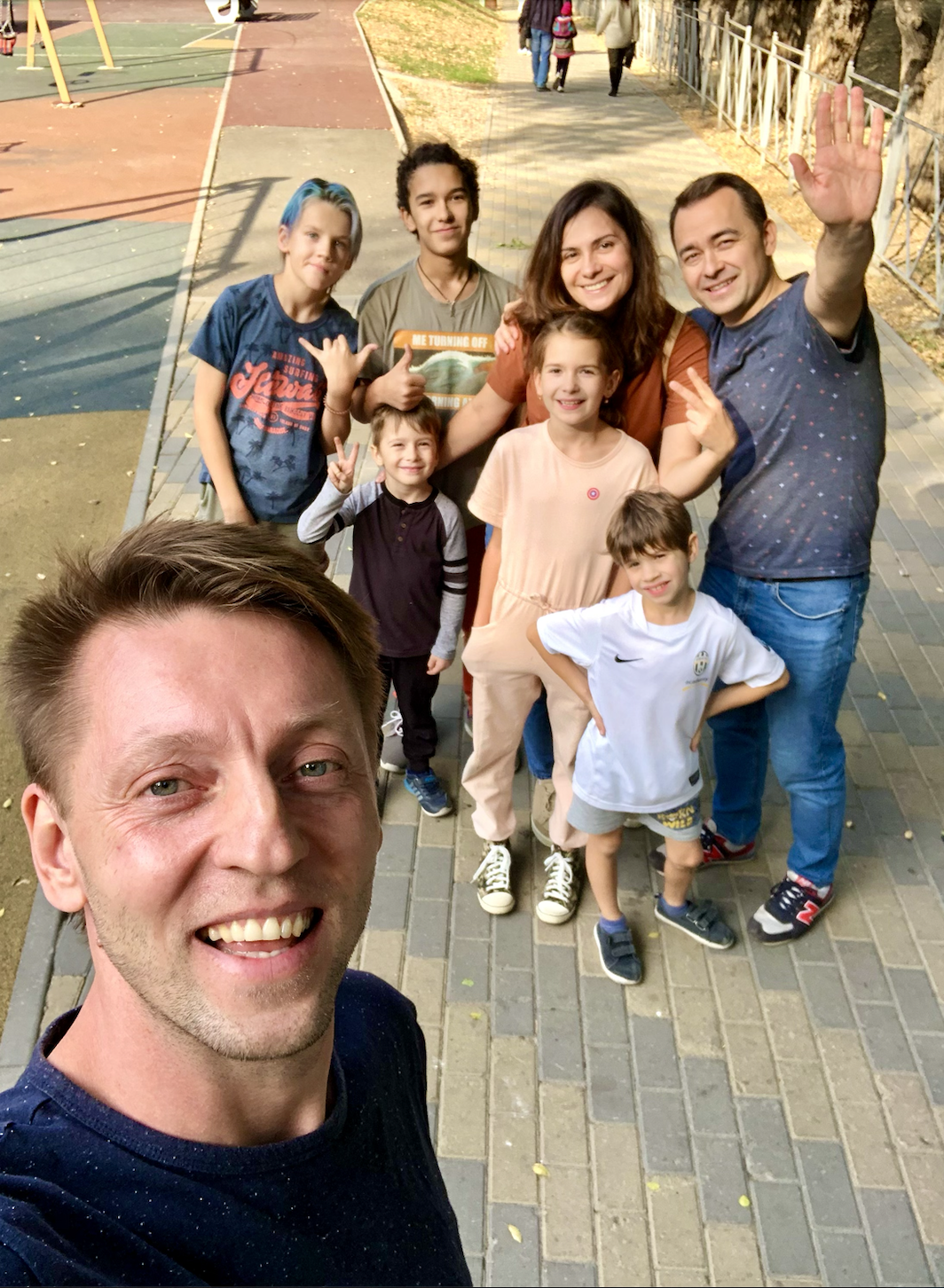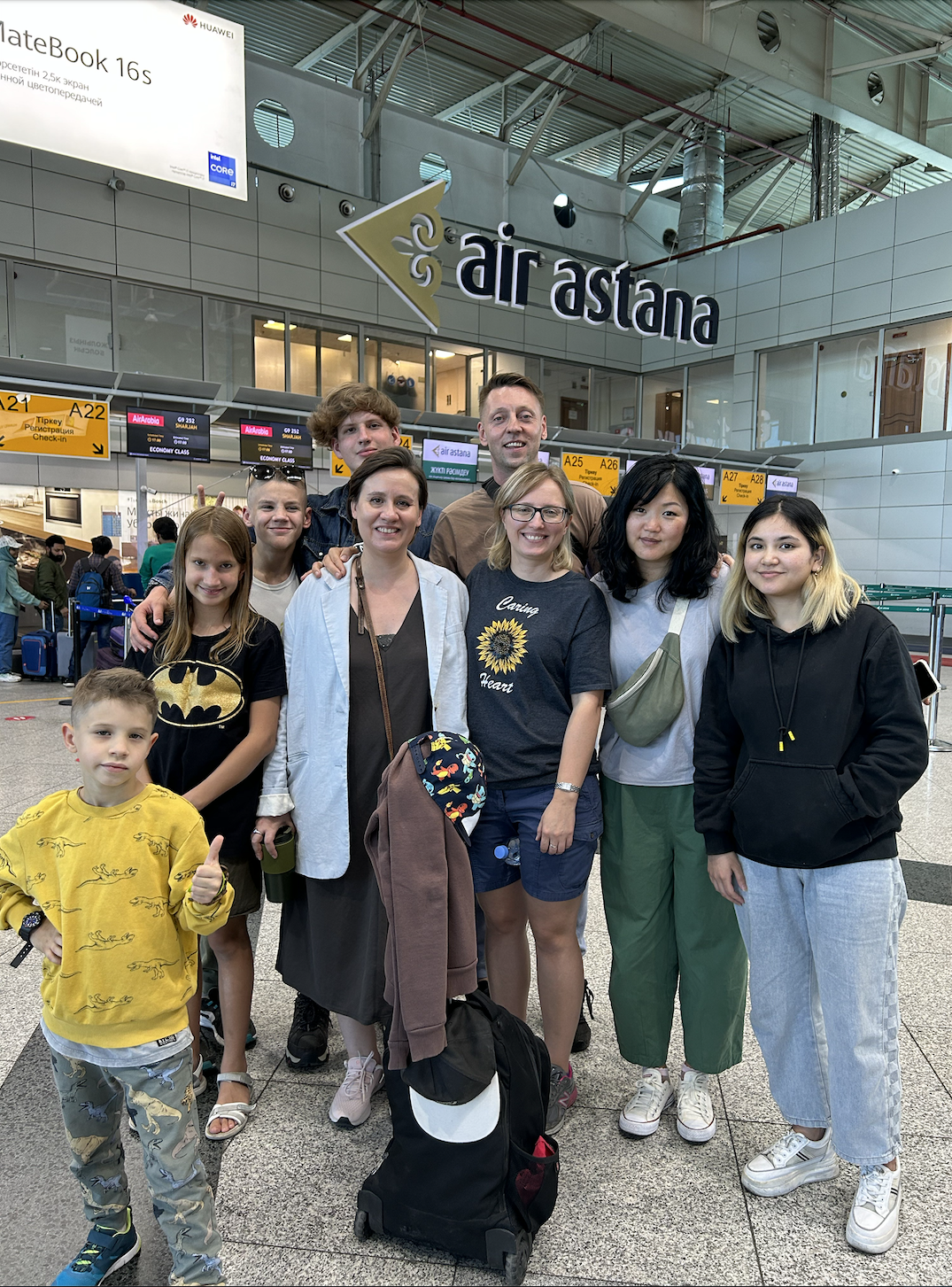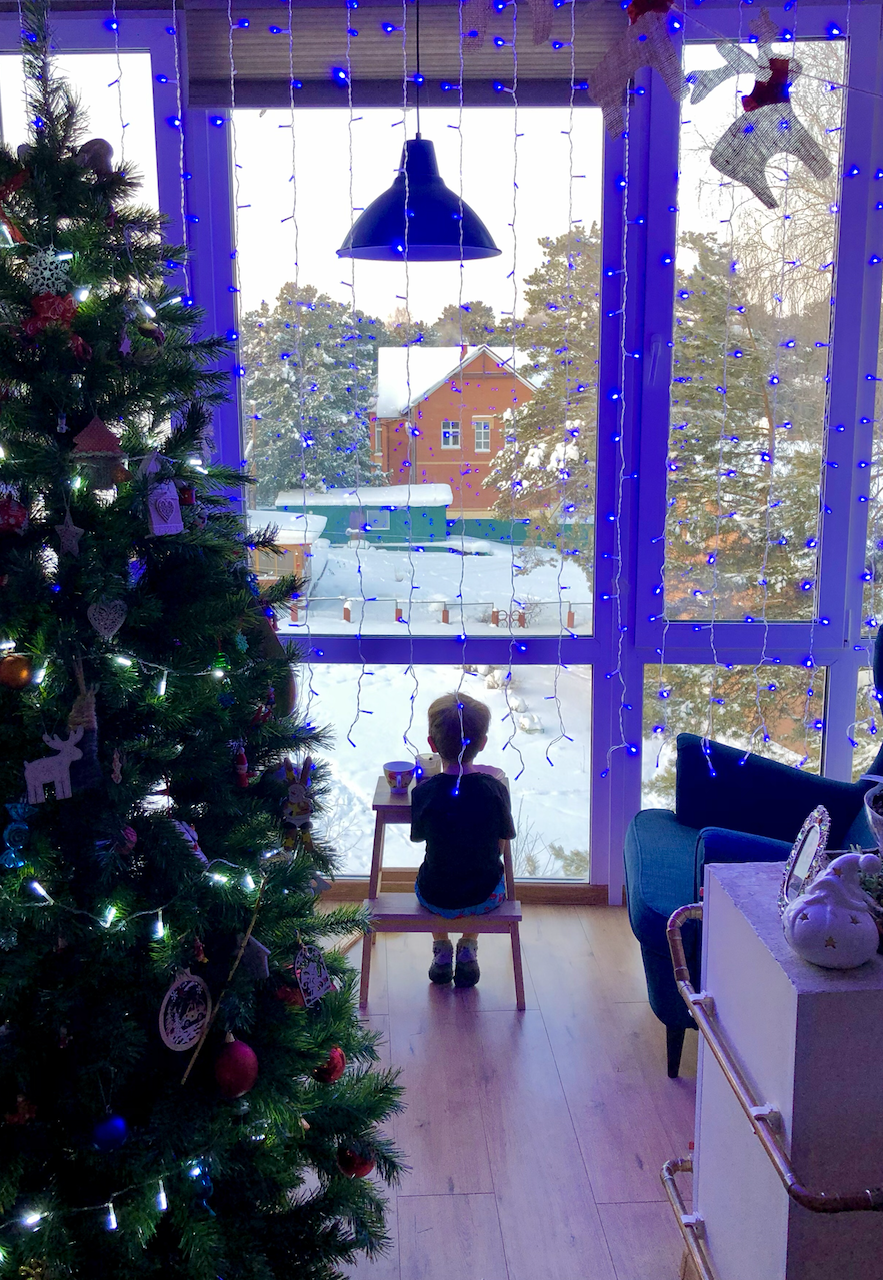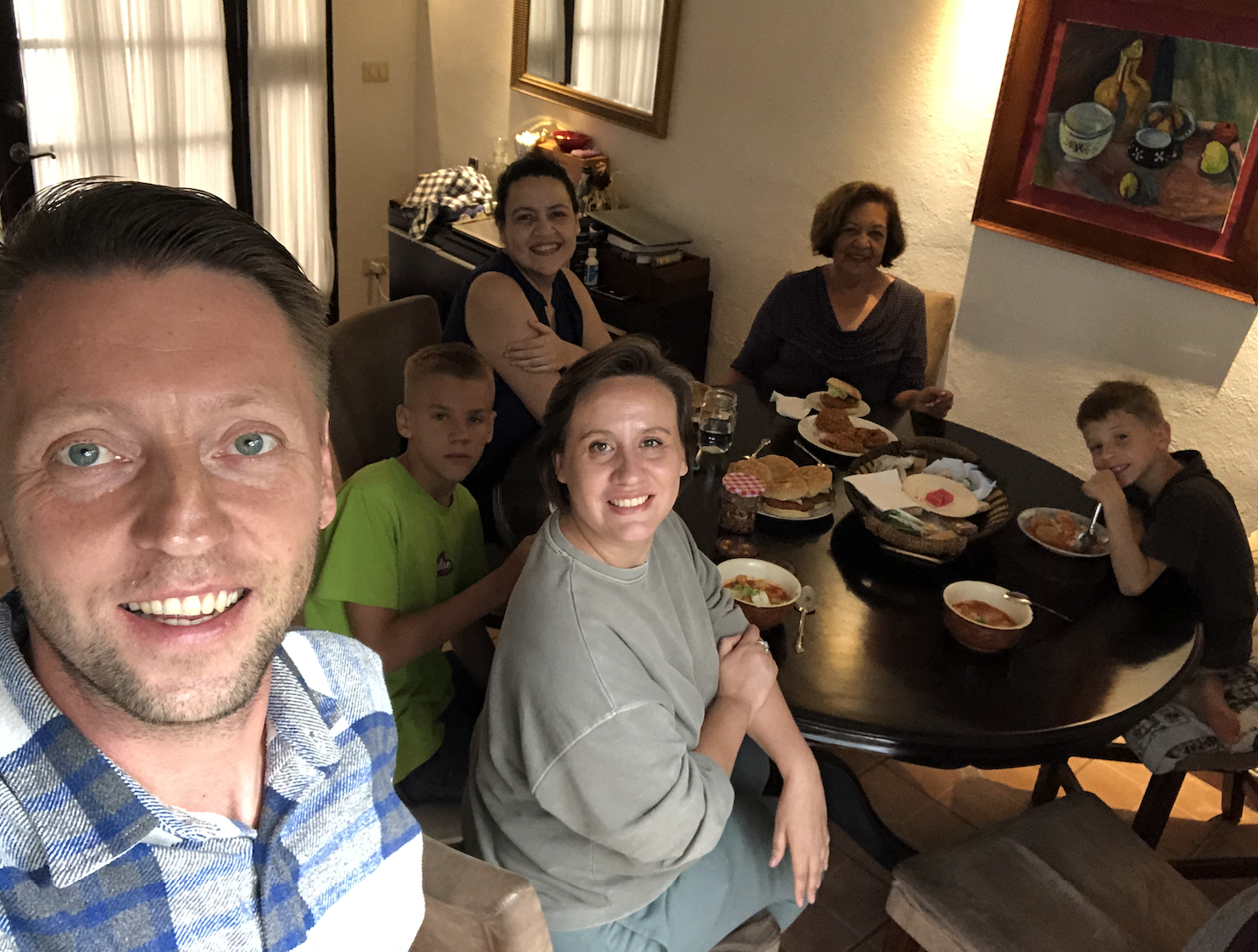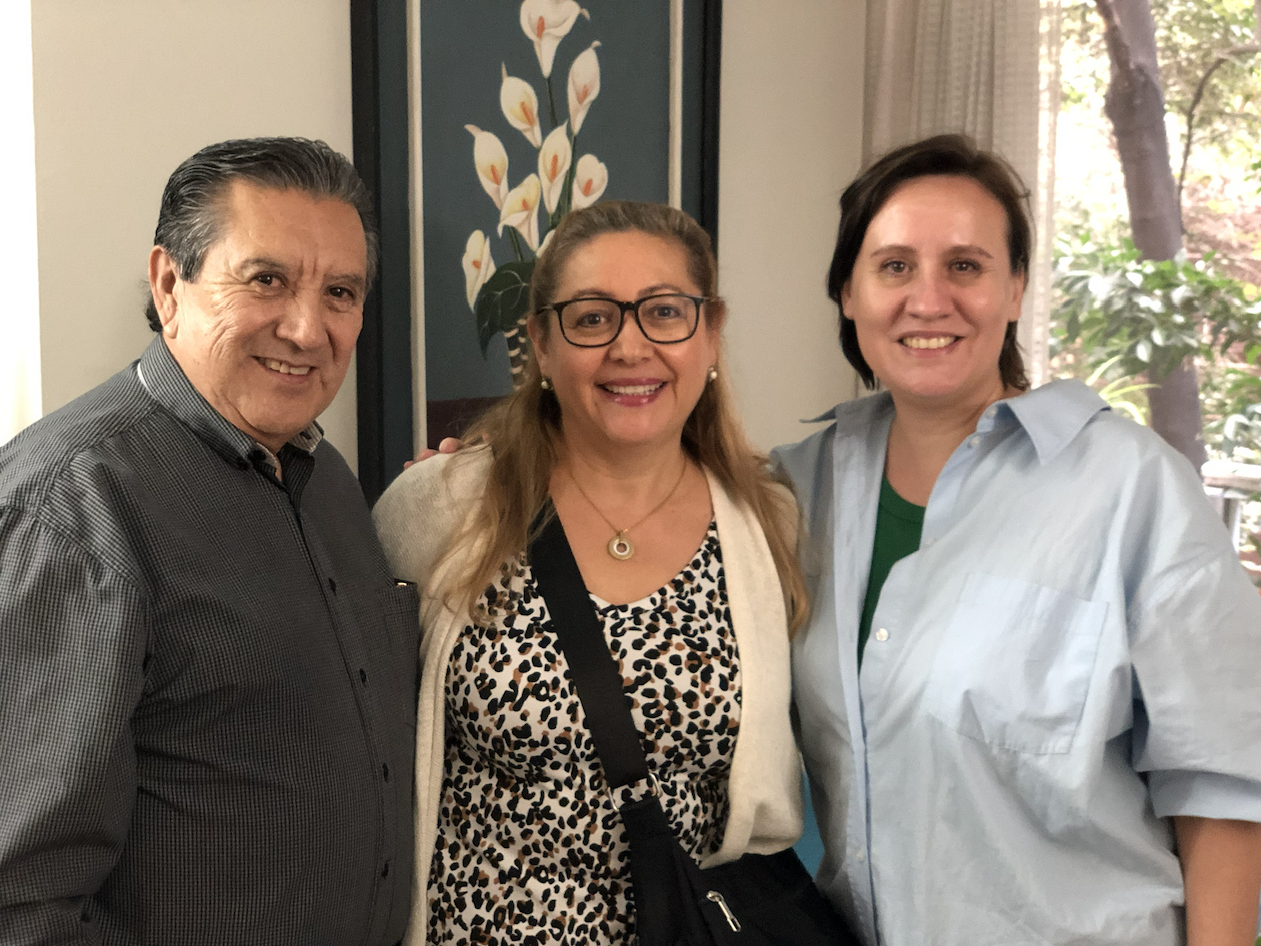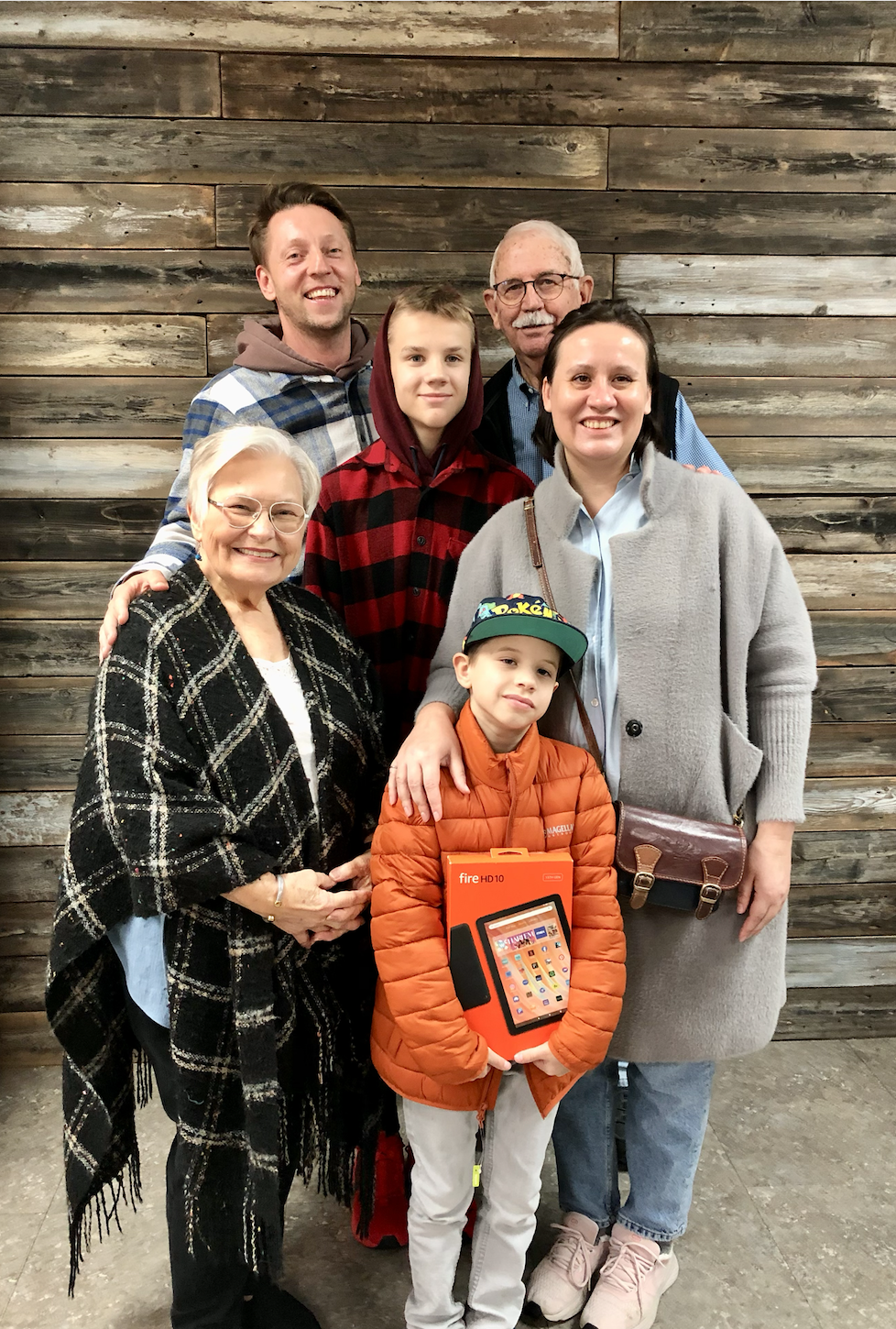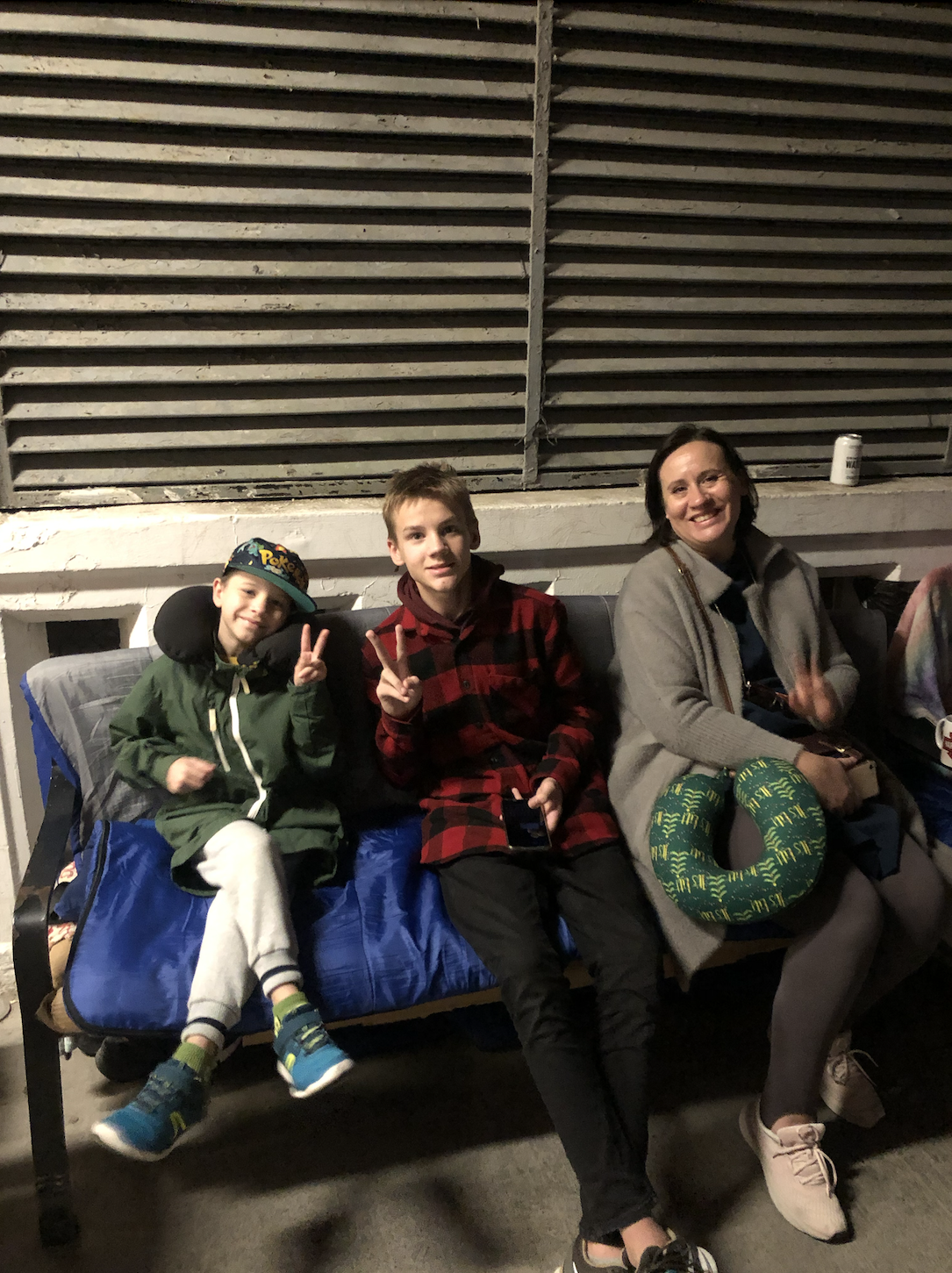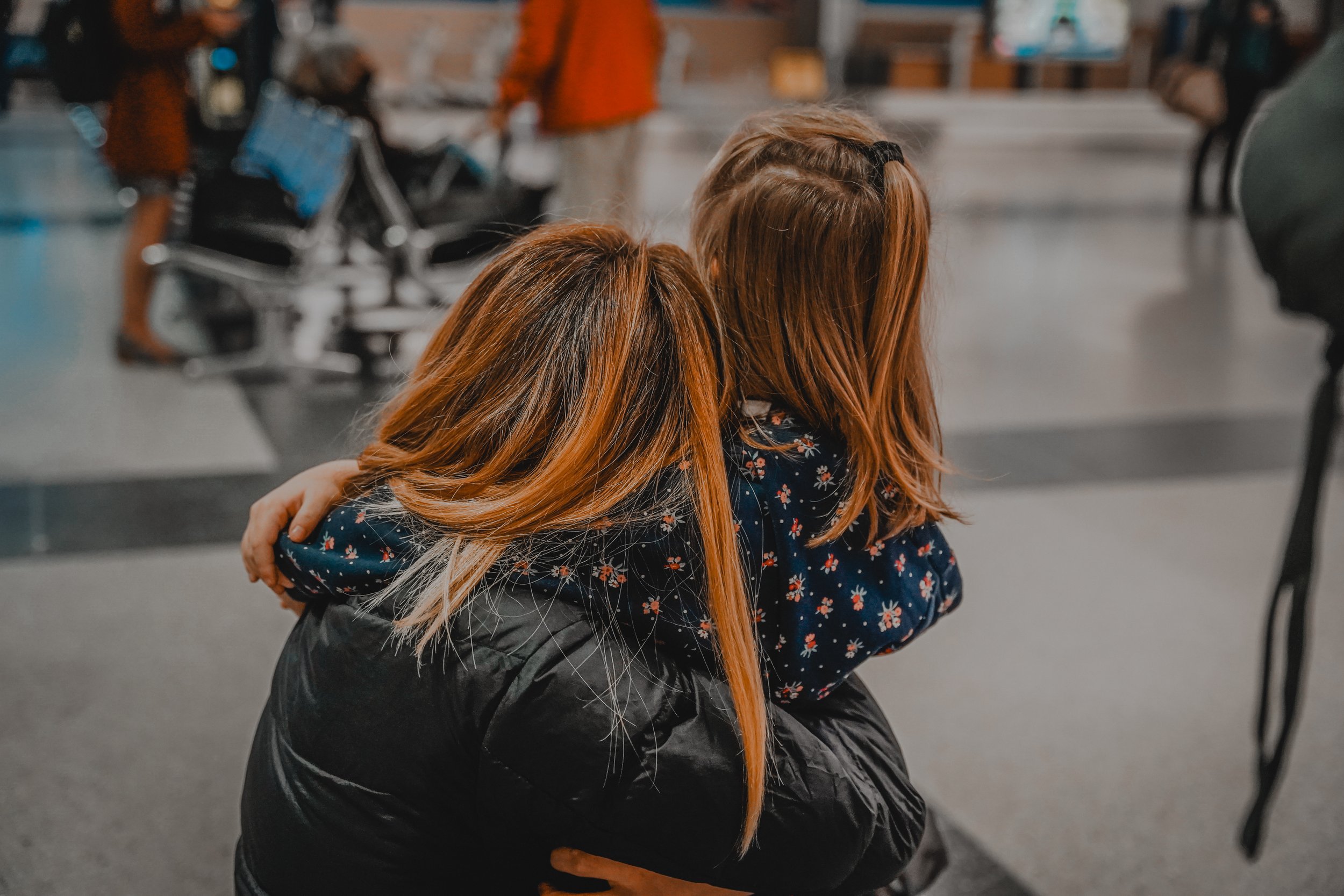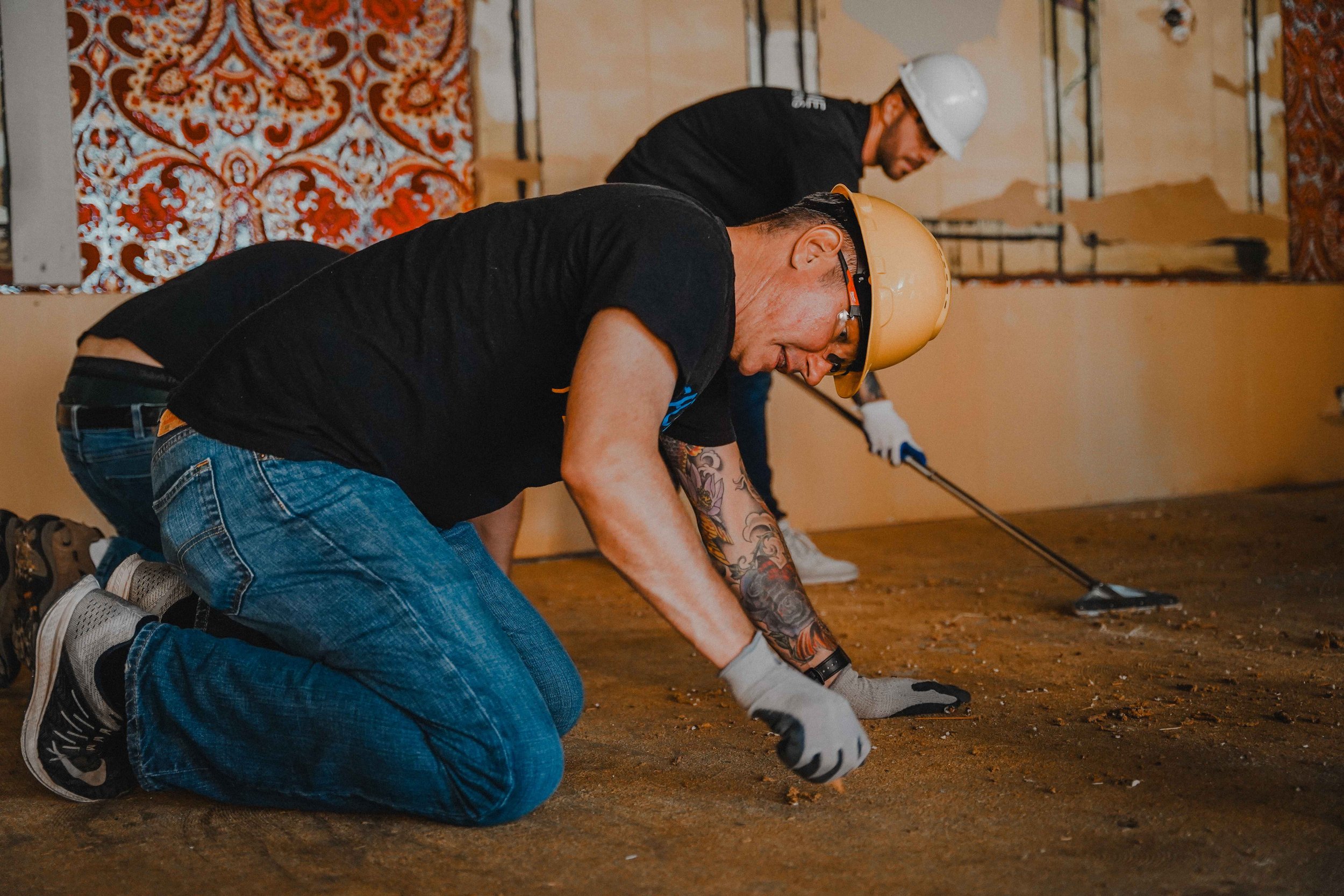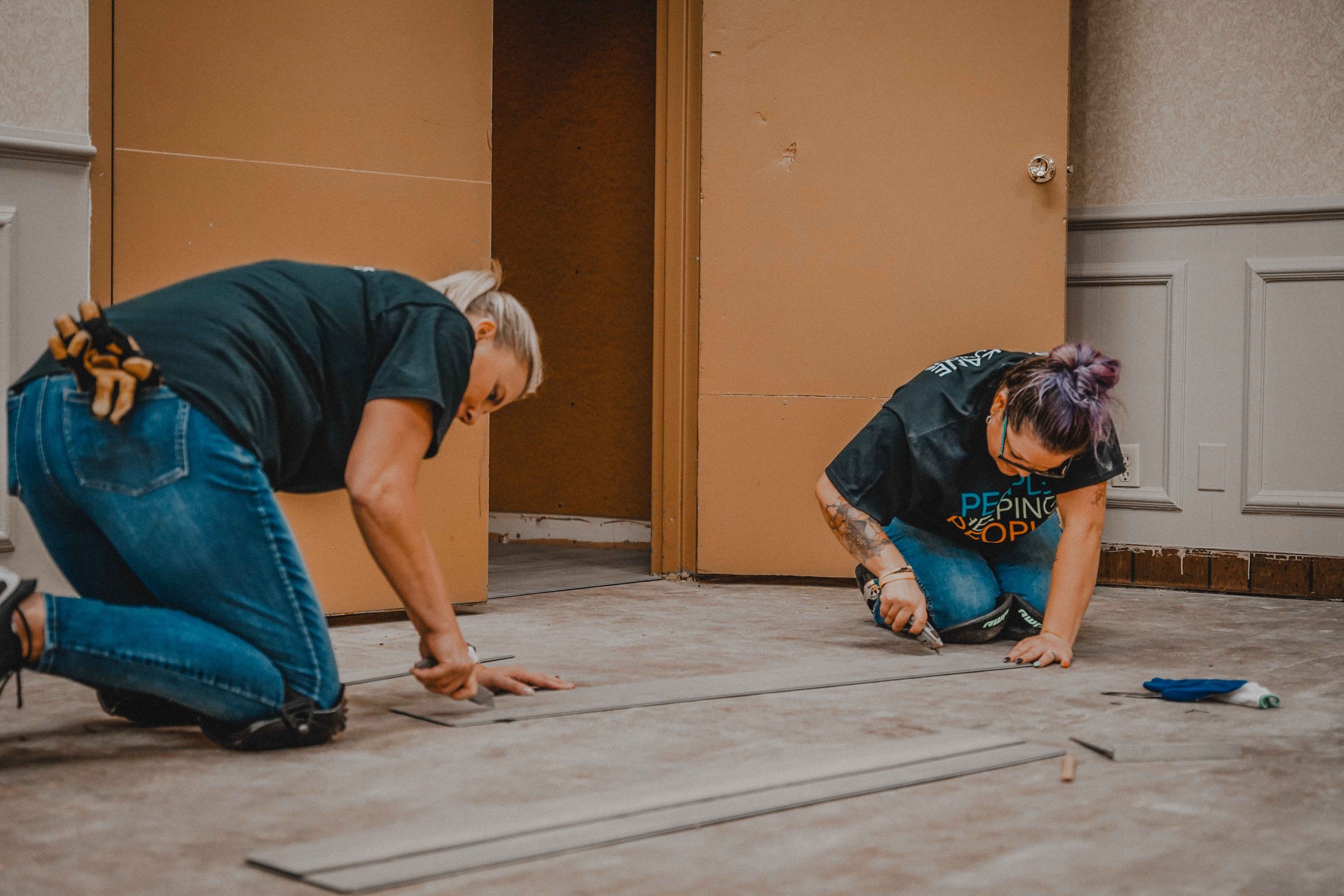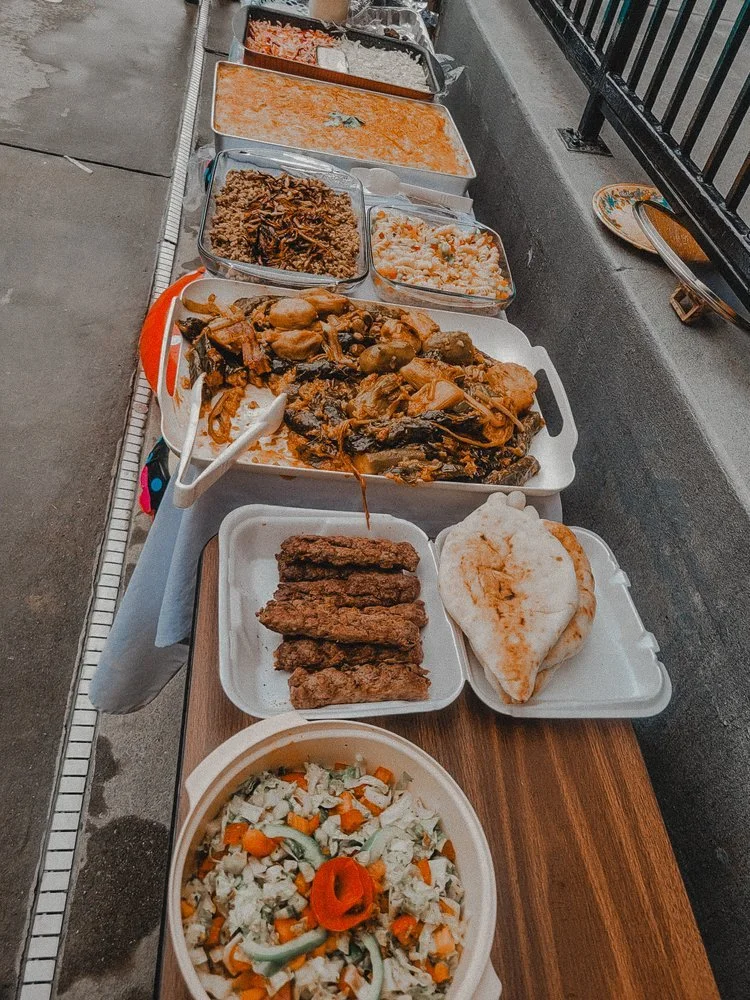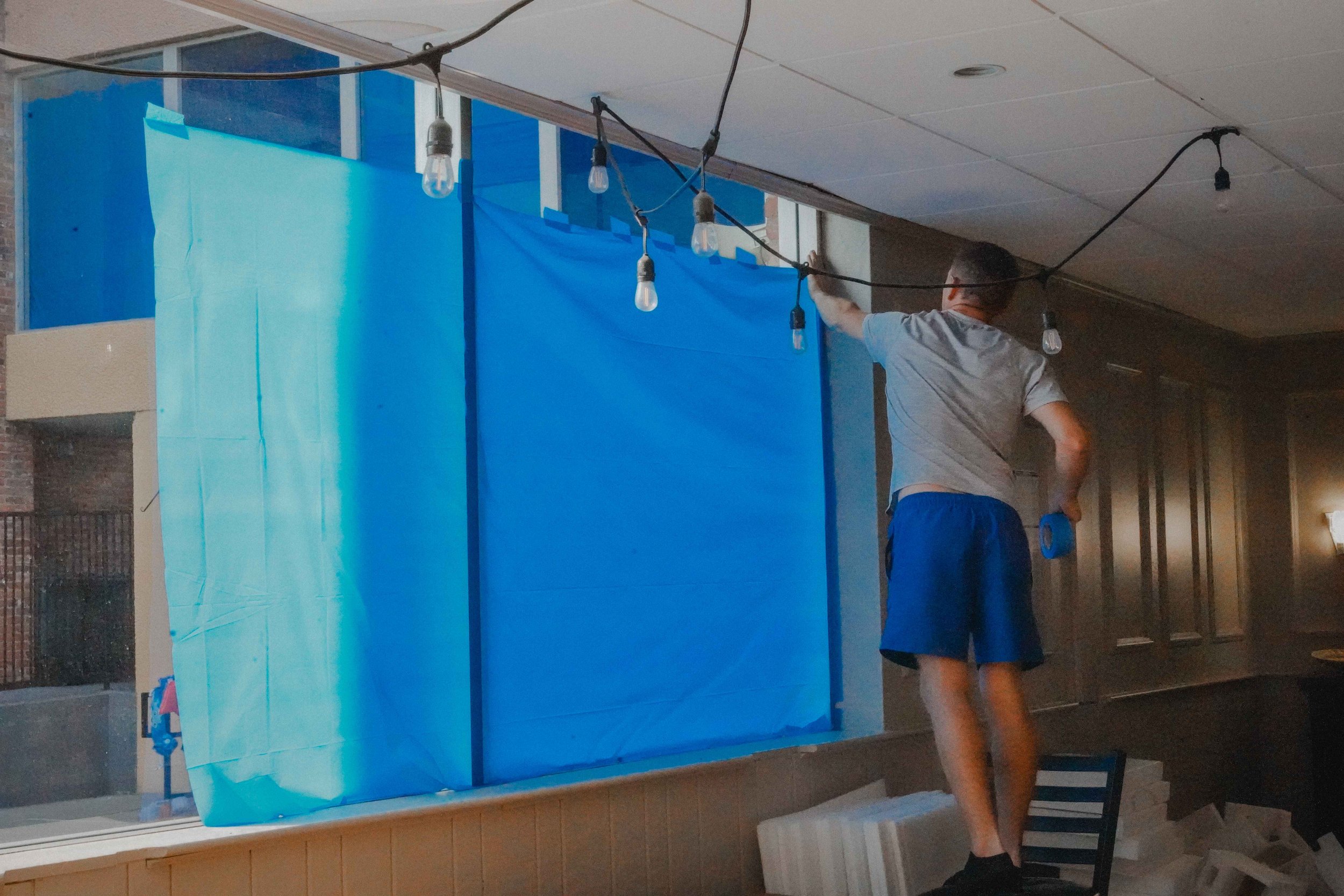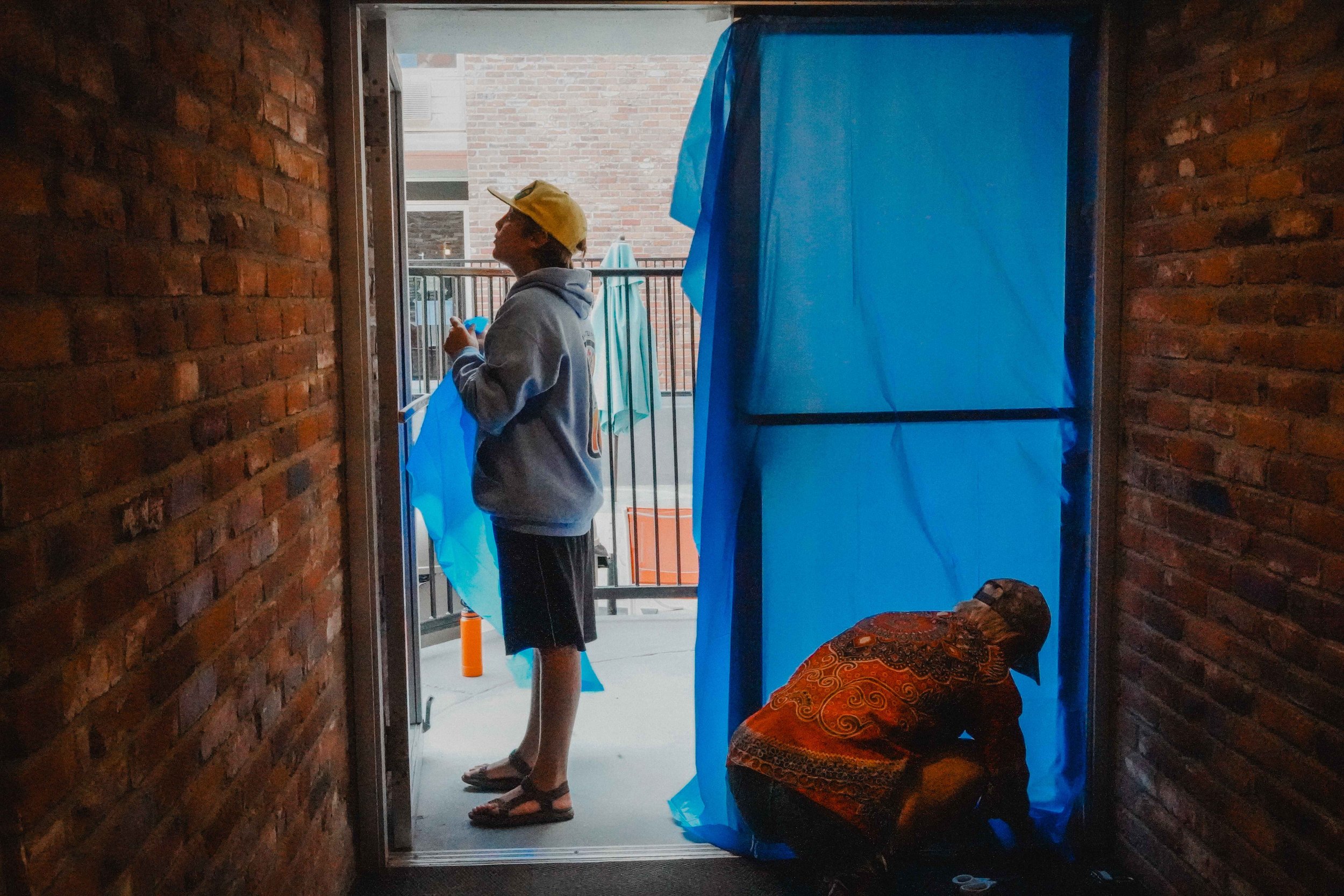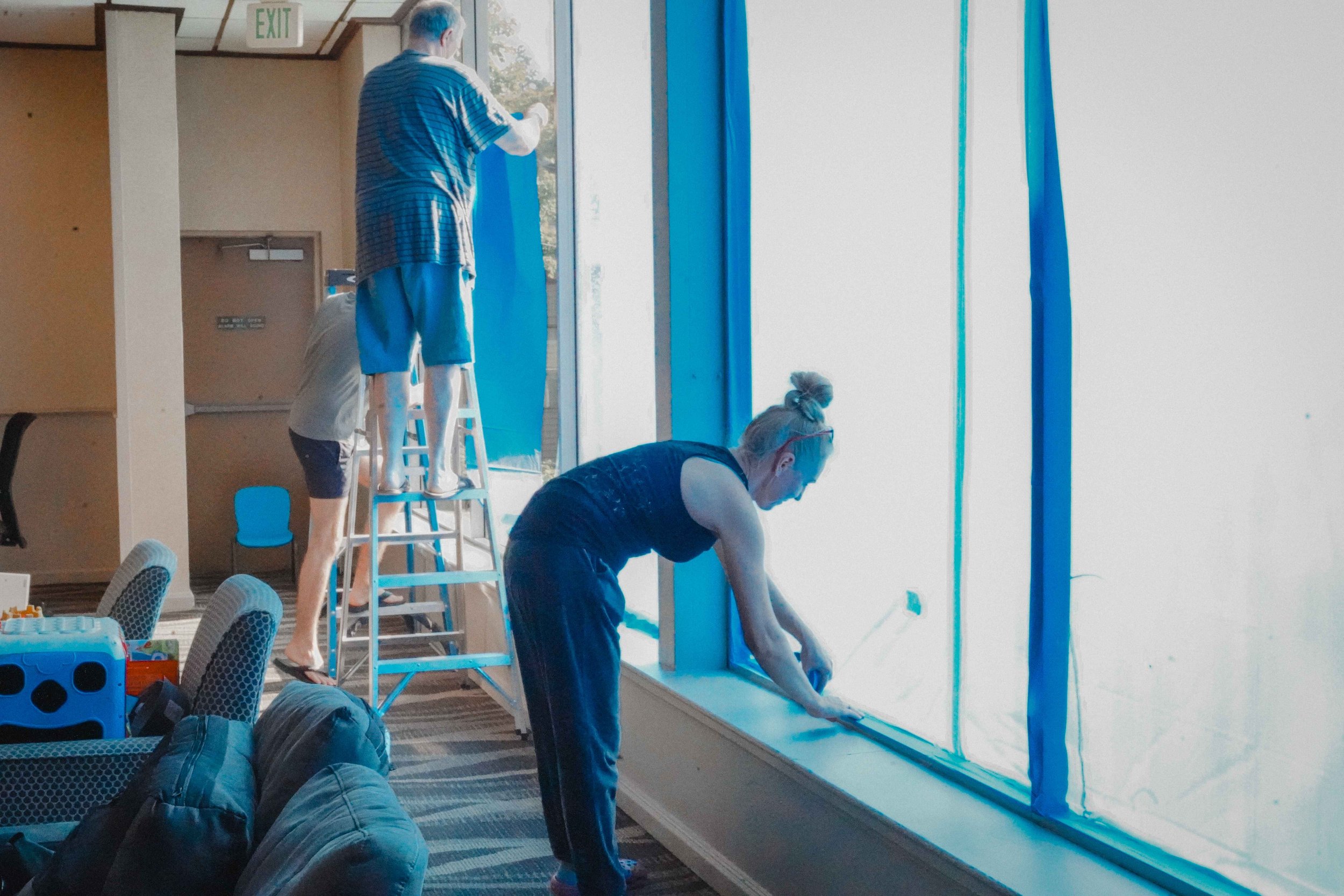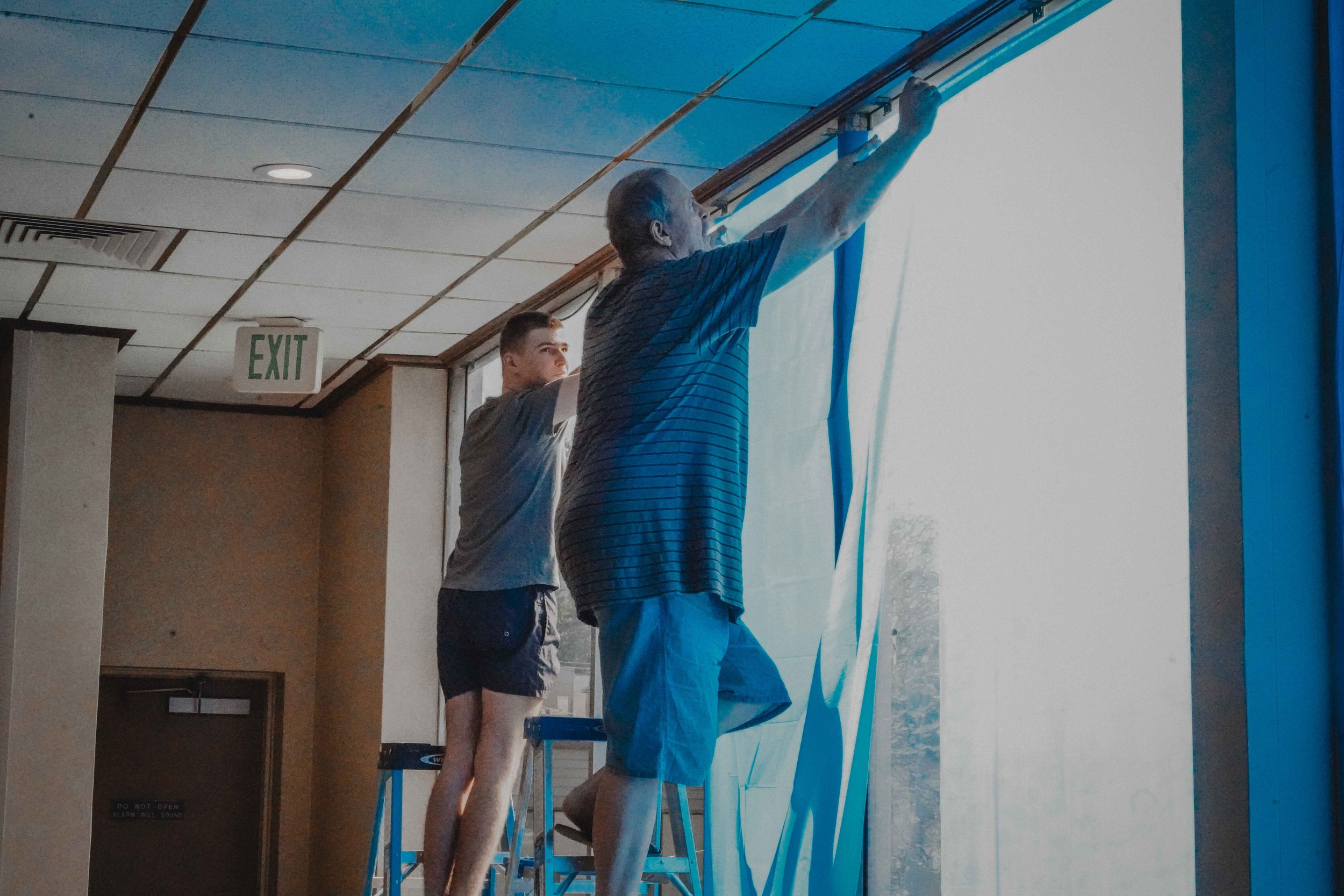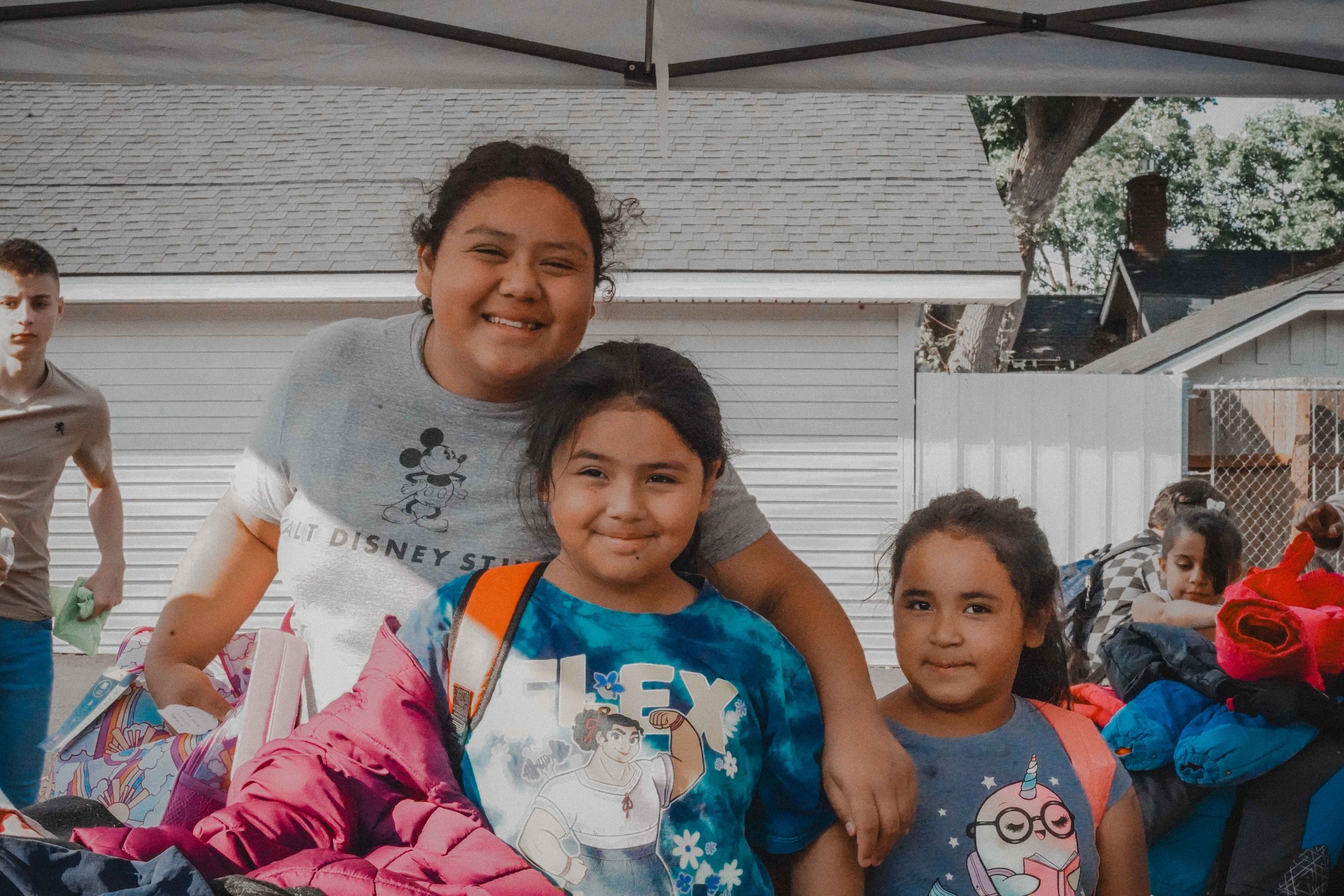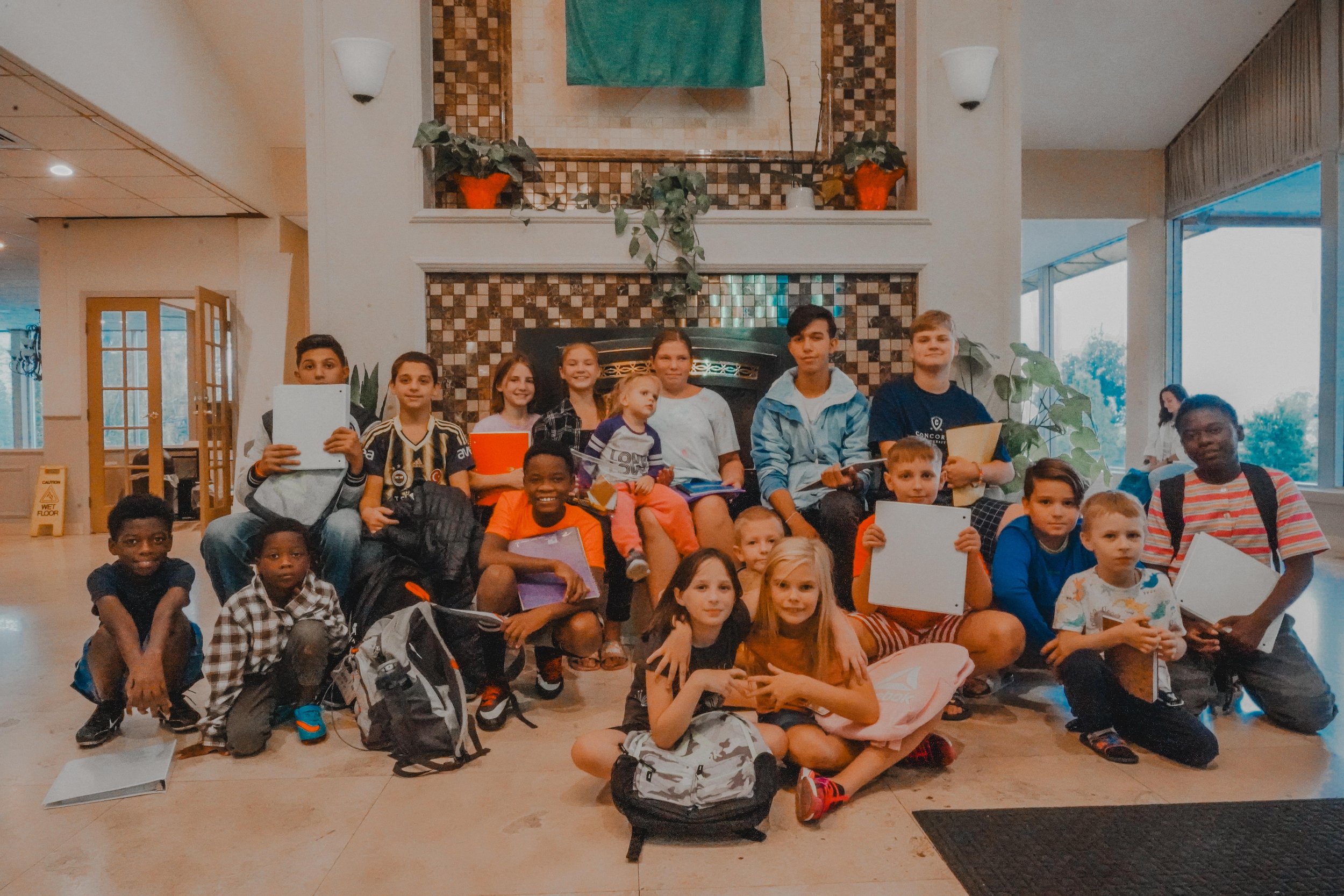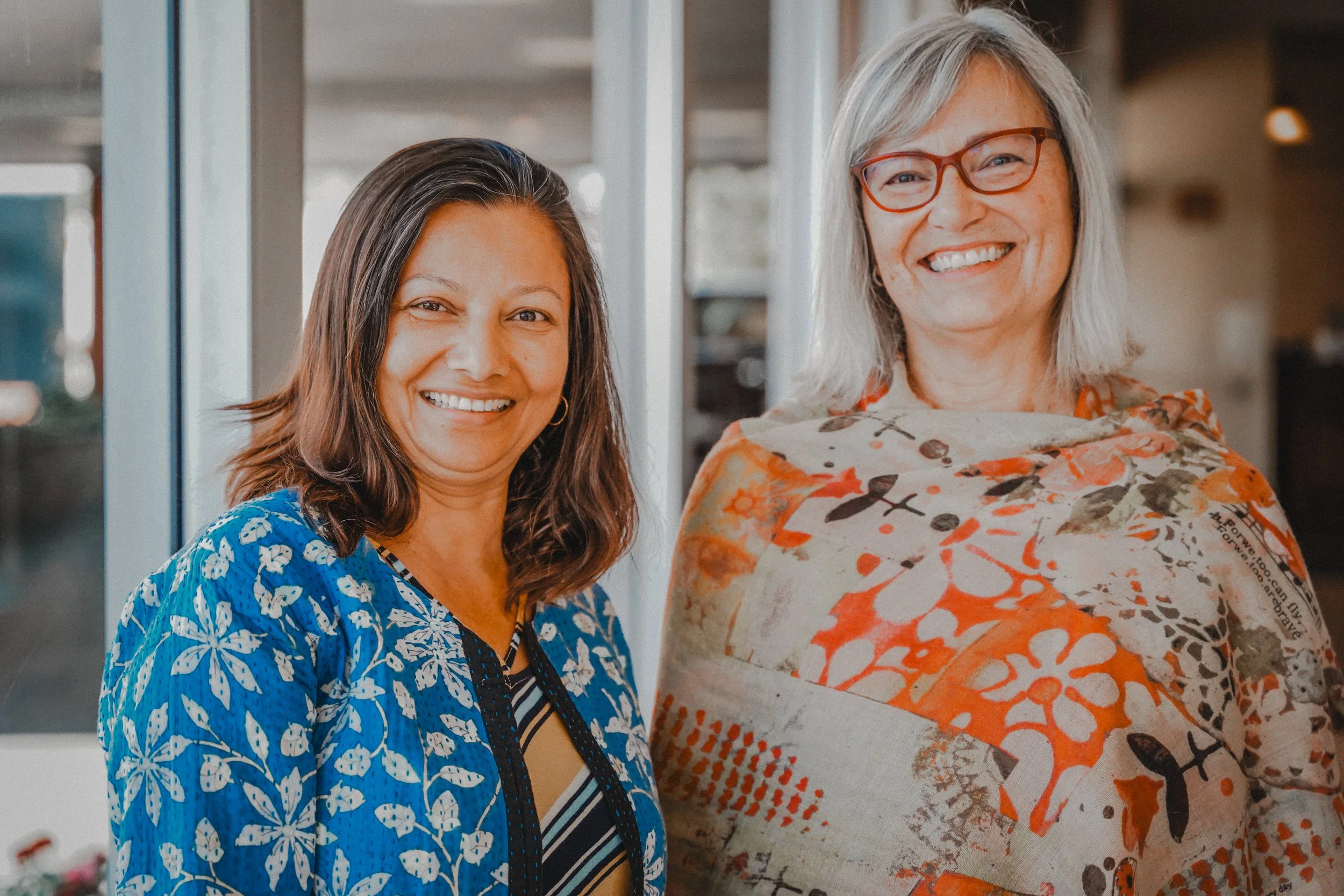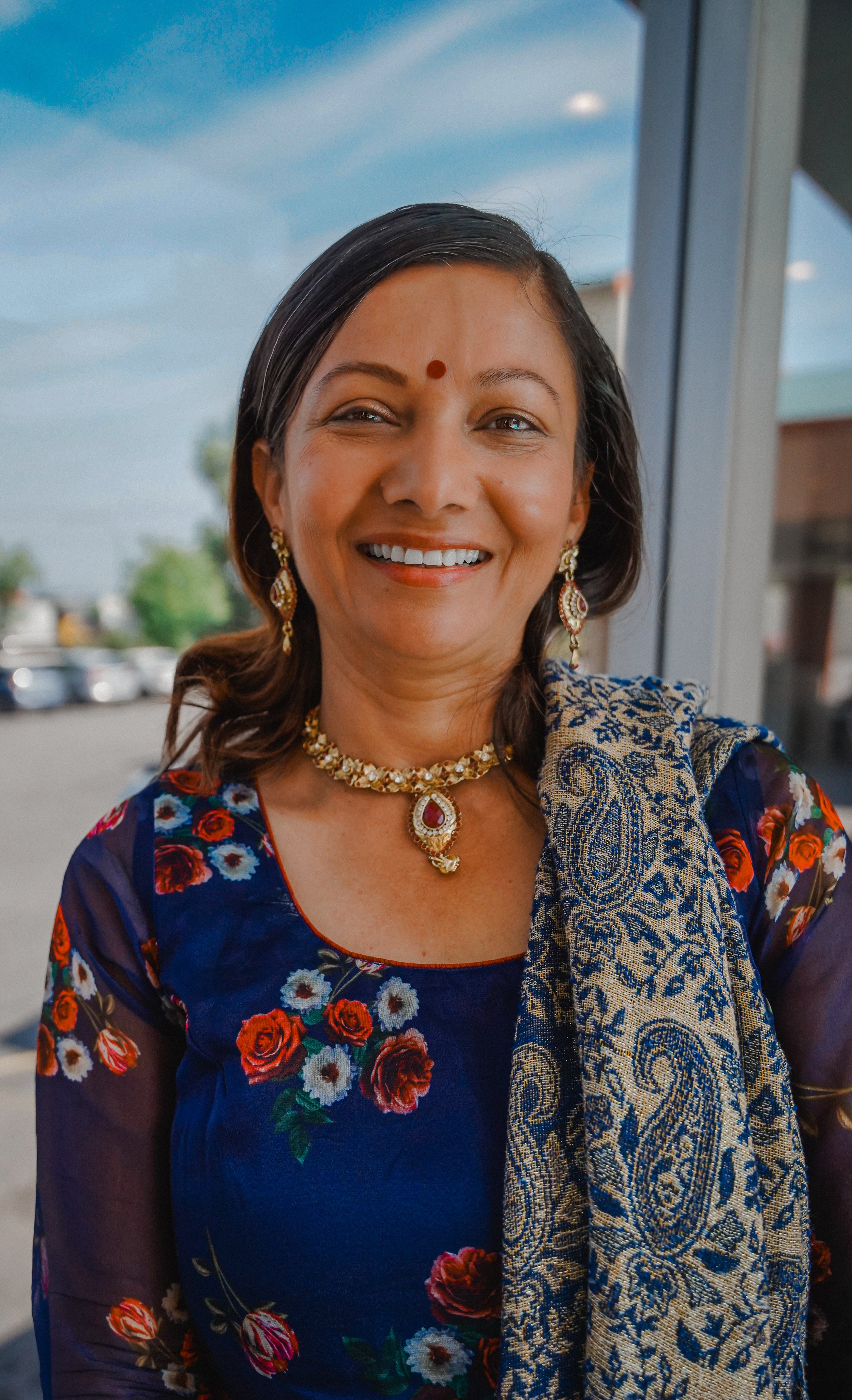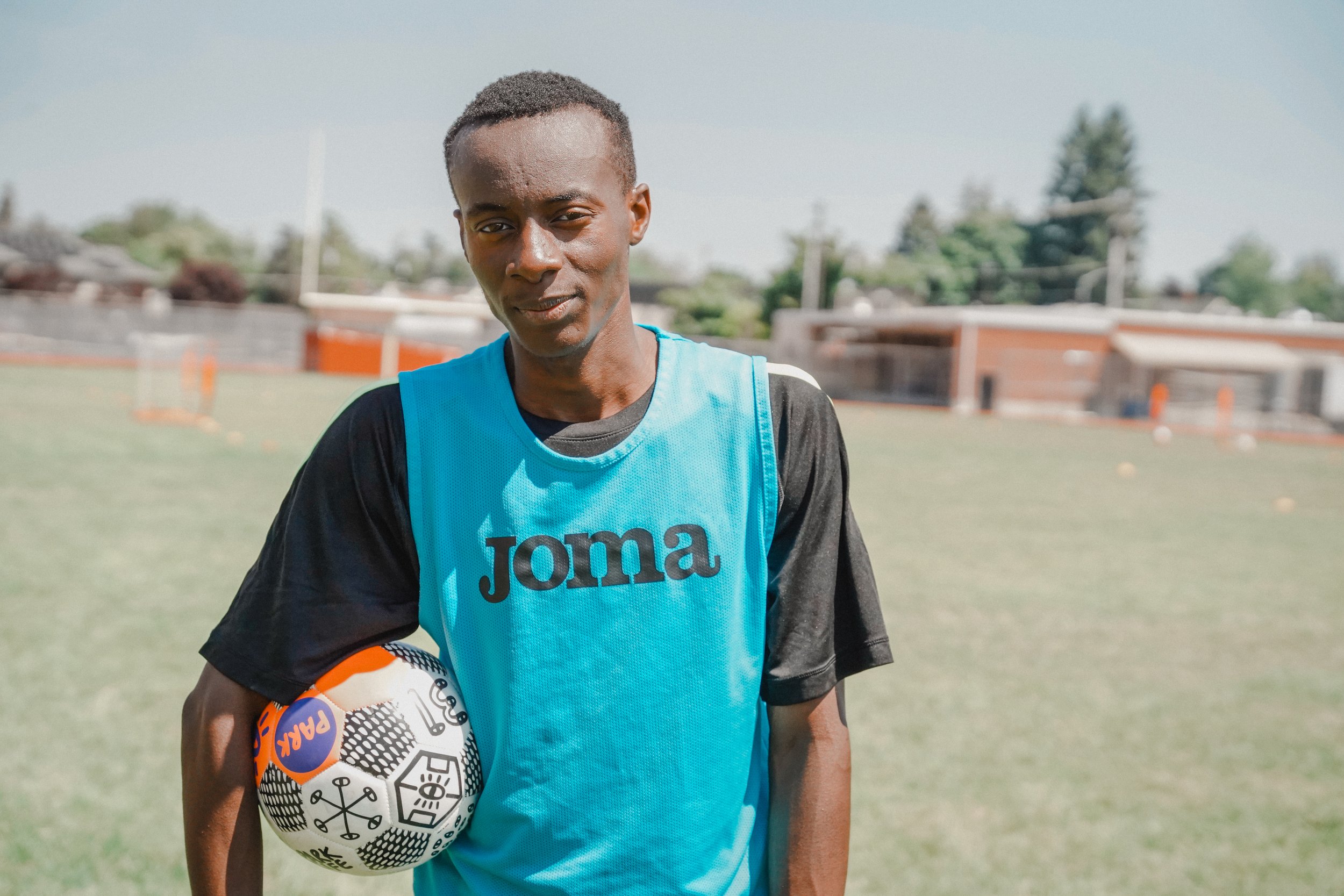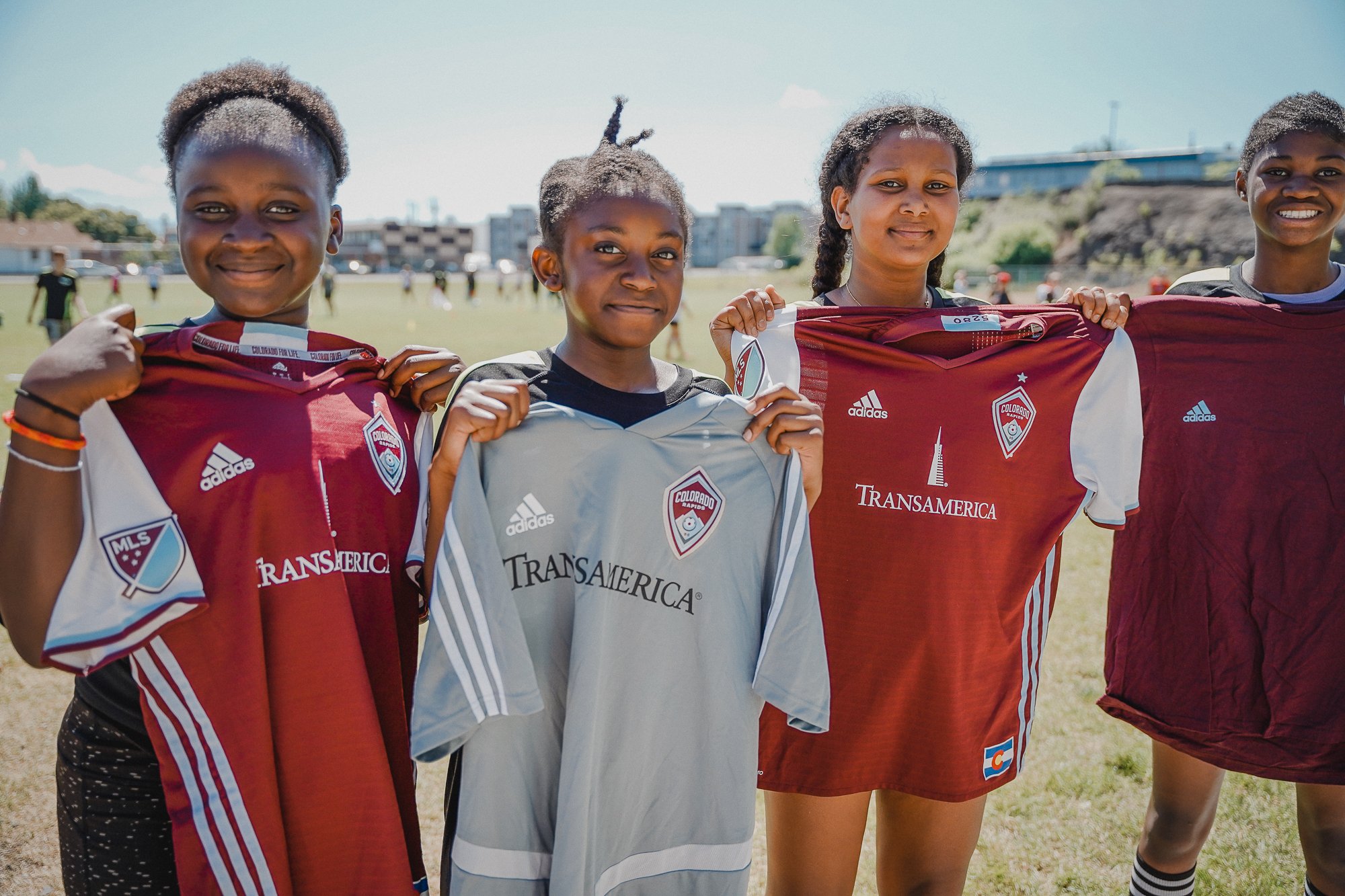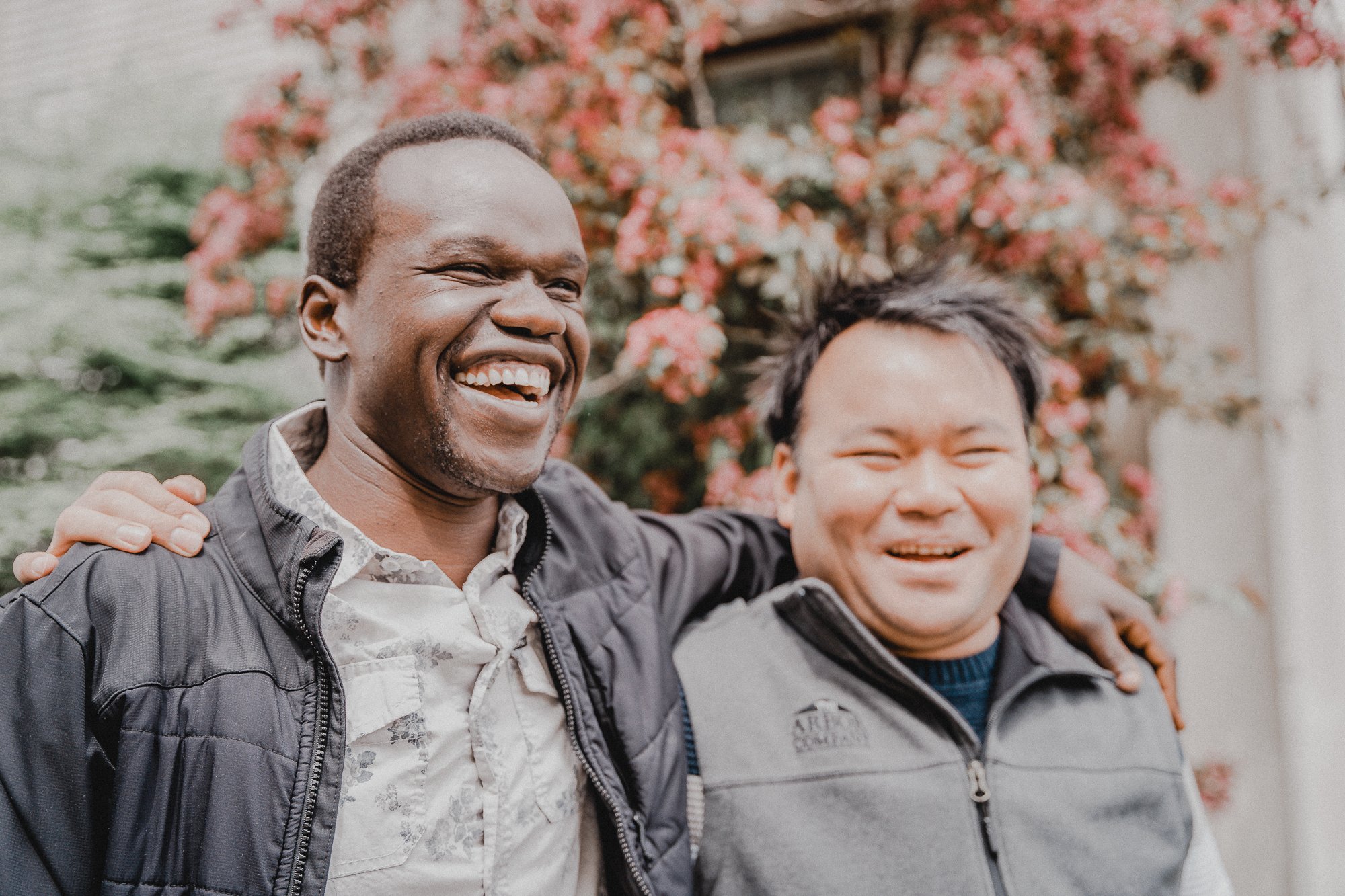
Thrive Center Stories.
The latest stories from Thrive Center and news from Thrive International.
I Want My Kids to Have Better Lives Here.
By Nara Shin
Sugey and her two beautiful children (Azlix and Dioxer) are from Venezuela. Formerly employed at a children's hospital while pursuing her dream of becoming a nurse, Sugey's deep love for children fueled her ambitions. However, her aspirations were thwarted amidst the political and medical complexities of Venezuela.
Her daughter suffered from a serious medical condition which could not be treated in her country due to a lack of qualified medical professionals and much-needed medications. She felt overwhelmed and hopeless. It was at this pivotal moment that Sugey decided to move from Venezuela to Ecuador. She felt that this life-changing decision would secure a better future for her children and ensure that would not have to go through what she has gone through.
Sugey stayed in Ecuador for four years, working as a self-employed vendor selling candy and cigarettes at bus stops. However, in 2022, a director and a tutor at her son's school began to bully him, and another student at the school was killed by fellow students. Fearing for her son's safety, Sugey decided to start a journey to the United States in search of a better quality of life, which values freedom.
Forced to navigate dark jungles and dangerous cities, Sugey and her children faced unimaginable risks. "I am so sad because I left all my family behind in the country and I don’t any family outside this country," Sugey said.
After an arduous journey, Sugey finally found refuge in Chicago. Her arrival however, brought new challenges as she struggled to find employment. She flew to Seattle to find better options and support. It wasn't until she reached Seattle and encountered Thrive at a local church soccer field that her fortunes began to change.
Now residing in the DoubleTree hotel, where Thrive provides temporary housing for asylum seekers contracted with King County, Sugey expressed immense gratitude, stating, "I am so happy and thankful right now because Thrive is my family now."
Looking ahead, Sugey remains determined to continue her work at a children's hospital, aspiring to offer care to those in need. Her ultimate desire is to ensure her children lead lives far removed from the hardships she endured. "My everything is for kids, and my kids are everything for me," she said.
Sugey looks forward to a brighter future where she can achieve her dreams and provide her children with the opportunities they deserve. With her unwavering spirit, she is on her way to creating a new life filled with hope, promise, and a sense of belonging. "Sometimes, I feel alone. I feel no support. But I really want to put my best effort into this country," she shared.
We are Russian refugees.
By Nara Shin
Igor, a Russian refugee seeking asylum in the United States, embarked on an unexpected journey from the heart of Russia to Spokane. Starting in September of 2022, Igor’s and his wife Tanya's lives took a dramatic turn as the war between Russia and Ukraine became a stark reality forcing them to make the difficult decision to leave their homeland.
Igor and Tanya got married in 2005 and moved around different cities in Russia–St. Petersburg, Moscow, and Tomsk (the southern part of Russia near the Russia-Kazakhstan border). Young and happy, Igor enjoyed his life with Tanya. In Tomsk, they became parents and started their lives together. Tanya taught aesthetics, ethics, and etiquette at Tomsk State University (TSU) which is the first university in Siberia, and Igor worked at a big global company as a sales manager. At that time, Igor explains, “We never thought about leaving Russia. We didn’t need it. But when the war became a reality, I couldn’t live there anymore.”
Despite being Russians, Igor and Tanya opposed Russian propaganda and war, leading them on a path filled with sacrifices and heartbreak. It was a hard decision for Igor to make. “I worked at my company for six years. I didn’t want to lose that job. I couldn’t decide by myself, so I prayed to be laid off to make the reason to finally leave home. I was afraid,” Igor said.
During the war, Igor also lost his closest friend due to differing stances on the war. Igor had known the friend for 15 years, and they met several times a week. However, Igor said, “I supported the Ukrainian government, and my friend didn’t.” This left a deep pain in Igor’s heart that the friendship should be separated and ended because of the war. “We lost all our good life. It was very good. We even lost our friends,” he said.
The couple's decision to leave Russia accelerated when Vladimir Putin announced partial mobilization on September 21, 2022. They packed their necessities in their carry-on bags and moved to Almaty, Kazakhstan.
While staying in Kazakhstan for 11 months, Igor worked and rented a house. However, a temporary stay in Kazakhstan brought challenges, with fears of mobilization and high rents, prompting a move to Mexico in pursuit of asylum in the United States.
Unlike Ukrainian refugees getting the United for Ukraine (U4U) humanitarian parole sponsorship, Russian refugees cannot get sponsorships through the U.S. government. Igor’s family, therefore, went to Istanbul and fled to Mexico to schedule and wait for his Customs and Border Protection (CBP) appointment for asylum. They were expected to wait in Mexico for about 1-2 months, but they ended up staying in Mexico for about 150 days without being able to work and find legal help.
Igor said, “In Mexico, it was the first time in my life when I went down deeply emotionally. I have never felt like that before. My time in Russia after the start of the war… It was like a Cedar tree. Cedars can’t live in Siberian winter because they can’t grow and they can’t breathe. It’s too cold. But they stand and seem to endure and survive. There is a Ceder forest in front of the windows of our house in Russia. I was like a Cedar tree. I was holding myself, but I couldn’t breathe or live because it was too cold.”
Igor felt desperate, but some families helped him with love, care, and support in Mexico. Igor shows his gratitude to them for taking care of his family, and says that they ignited hope in his deepest heart. With the support from the local community, Igor, Tanya, and their two children waited and waited until January. Finally, they crossed the United States-Mexico border as a family and were guided by CBP officers for the asylum-seeking process.
When they finally stepped on the land of the United States, a series of miracles happened to them. An old American couple living near Dallas drove 700 miles to pick Igor’s family up from the CBP border office and hosted them in their house for a week. They did not know each other at all, but the couple was willing to help after getting connected with Igor’s old church in Kazakhstan through their choir performance on YouTube and learning that they arrived in the U.S. seeking asylums.
The couple's generosity extended to their church and local community, raising funds for Igor's family. With friends in Spokane, Igor dreamed of reaching this city and applied for housing at Thrive Center six months ago. It became a reality, thanks to a supportive community that arranged flights and even purchased a car. Igor did not know any of them, but the local community’s support poured unconditional love into Igor’s family right after they arrived in the new land.
“I am thankful that we have a place where we can rest, call, and sleep well. Even though we arrived here in January, Thrive and volunteers made a blanket gift for my family as a Christmas gift. It is a big, huge, warm blanket,” Igor said.
Looking ahead, Igor dreams of becoming a caregiver, driven by the love and support he received. Although he currently lacks work authorization, he's committed to learning English at a local school, envisioning a future where he can connect with people and build relationships in his newly adopted land.
Igor's story is one of resilience, community support, and the pursuit of hope amid challenging circumstances. From navigating the complexities of seeking asylum to finding unexpected warmth and support in a new land, his family's tale resonates with courage and community. As they settle into Thrive Center, Igor's journey remains a beacon of hope, illustrating the transformative power of kindness and solidarity in the pursuit of a thriving community.
Want to help empowering refugee families like Igor’s?
Two Years in the States
By Nara Shin
Yuliia is from Ukraine. She unexpectedly started her journey to come to the United States in May of 2022, just three months after the Russian-Ukrainian war started. Initially, leaving her homeland was not a part of Yuliia's plans. However, when bombs blasted in her city, she made the difficult decision to seek a secure haven for her family.
“Everything was so good. My life was good before everything happened,” said Yuliia. She was a hardworking administrative manager at a company in Ukraine. Yuliia and her husband just bought an apartment after dreaming long of their own house. However, their aspirations took an abrupt turn when their city became a danger zone, compelling them to urgently seek safety. Thankfully, a family member already residing in Spokane sponsored their United for Ukraine (U4U) visa, leading them to sell their car in Ukraine to afford flight tickets for their journey to the United States in pursuit of refuge on May 29, 2022.
Arriving in the U.S. with little more than the clothes in their luggage, Yuliia faced the daunting challenge of rebuilding her life from scratch. She said, “When we came here, we didn’t have anything. We didn’t have money. We didn’t have any documents. It just looked like we were starting from zero.”
Amidst linguistic and cultural barriers, Yuliia discovered Thrive Center in June, becoming one of its first residents. With the support of Thrive staff, she found not only employment but also a community where she could make connections with other Ukrainian refugees and get help with medical insurance, workshops, and educational resources. Starting as a front desk assistant at a dental clinic, Yuliia's journey has come full circle as she now serves as the Assistant to the General Manager at Thrive Center.
She is the first person people see when they come to Thrive’s building, and she has helped and navigated 300 families moving in and out of the center. With her bright personality, she greets people and builds connections with residents so that they can find comfort and hope through her. Collaborating with Thrive’s resource coordinators, Yuliia also assists others with documentation and any immigration concerns and provides translation services.
Expressing gratitude for the opportunities she's been given, Yuliia finds joy in empowering others to thrive. However, the uncertainty of her future weighs heavily on her mind as her humanitarian parole is set to expire on May 27, 2024. In the last week of May, she will lose her work authorization and have to leave the country, unless another immigration pathway opens up to her.
“The war continues, and it’s not stopping. Going back home is not for my safety. It’s dangerous. We will be happy to receive any help. It is very important for me because I still continue to stay here, help people, and see so many people thriving. It’s making me happy,” said Yuliia.
Yuliia's story shows resilience and hope amidst adversity. From the once-thriving administrative manager in Ukraine to the unexpected refugee seeking solace in the United States and helping others at Thrive Center, her journey is a testament to the strength of the human spirit. Yet, the uncertainty of her future post-May 2024 looks uncertain, and her plea for help resonates deeply. Let us join hands in extending compassion and assistance, ensuring that stories like Yuliia's are not only heard but serve as a call to action for a world united in empathy and support.
“I just want to say thank you to everyone. Thank you to the people who helped change our lives and gave us the chance to live here legally and to support us. Let’s see what will happen in the future, but I want to thank you for everything,” Yuliia said.
Want to help empower refugee families like Yuliia’s?
A Life of Giving
By Nara Shin
Pam is a Sansei or third-generation Japanese American whose life has been woven with threads of compassion, resilience, and a commitment to serving others. Raised by parents dedicated to education, social justice, and community service, Pam has participated in the transformative power of love and giving.
As a retired educator, Pam's career took her to places to address inequality, especially working in War on Poverty programs like VISTA (Volunteers in Service to America) and Head Start. Her passion for equal education led her to work with refugees and immigrants, a cause close to her heart, as her grandparents were immigrants from Japan. Inspired by stories of Ukrainian, Eritrean, Hmong refugees and other immigrants, Pam is drawn to organizations like Thrive, recognizing the importance of providing support to refugees and immigrants in need.
Pam's connection with Thrive runs deep. She witnessed the life-changing work led by Thrive’s mission and heart to serve. Pam is a regular financial supporter of Thrive’s mission - to provide safe, transitional housing and unwavering support to those seeking refuge in Spokane.
For Pam, giving is not just about financial contributions; it's a holistic approach that involves offering time, talents, and creating meaningful impact. Her top three giving priorities line up with Thrive’s values: social justice, empowering individuals, and supporting culturally sensitive development.
Pam with Executive Director Mark, Youth Empowerment Director Jackson, and Youth Empowerment Coordinator Michael.
When Pam makes a gift, she says, "[I am b]lessed that I am in a position to give not only of talents but that I have had a life that has allowed me to give financially, too. I feel like I am giving back. I also feel lucky and happy.”
Pam hopes to walk alongside others with the same positivity and support she received throughout her life. To be an asset, a beacon of hope, and a force for positive change in the lives of those she encounters.
As we express our deepest gratitude to Pam Tajima Praeger for sharing her remarkable journey and for being an integral part of the Thrive community, we also extend our heartfelt thanks to all our donors who make stories like hers possible. Your generosity creates ripples of positive change, and together, we continue to thrive.
Want to help empower refugee families like Pam?
Holiday Reunion in a New Land
By Nara Shin
Kateryna is a young mom-of-two, living in the Thrive Center. She joined our center in September as a Ukrainian refugee. Her journey, marked by separation and challenges, reflects the complexities faced by those seeking safety. Originally planning to move to the States with her husband, daughter, and son, Kateryna ended up coming here alone with her one-year-old son Mark due to a documentation complication. After three months of living here in Spokane alone, Kateryna was reunited with her husband at the Spokane International Airport on November 30. Today, we talked to her to retrace her steps from a few days before she left her country.
Before the Russian-Ukrainian war started, Kateryna was a music teacher at a private music studio in Kyiv, Ukraine. For 12 years, she taught teenagers music with her passionate, joyful heart. Even when the war started, Kateryna tried to stay in Kyiv with her family for 1.5 years, but when the war continued with increased danger, she had to leave her home for safety and security. It was a long way for her. With two young children, she had to drive for long hours to Hungary. Even while they were moving and staying in Hungary, they continuously looked for plane tickets to America to find a secure place to stay.
However, the family could not find a safe place to stay in Hungary. Kateryna and her husband started their United for Ukraine (U4U) visa application with their dream to hope for opportunities since then. Nevertheless, they had to relocate to Switzerland due to ongoing documentation complications. Initially staying at a friend's house for a week, they eventually made the difficult decision to move to a refugee shelter for the ensuing weeks. It was a crowded space for the family to stay. The place was like a gym with plastic walls that divided people’s rooms without doors, and there were 550 individuals in one space. The facility only had four restaurants and four bathrooms for everyone.
After two months of staying there, their U.S. visas were ready. They were dreaming again to move to the States and at least live a better life. However, at the airport when they were entering the security checkpoint, Kateryna found out that her husband’s and daughter’s first names were misspelled in the U.S. visa.
“I was confused. I was shocked. I didn’t have time to decide slowly. Everything was decided so quickly,” said Kateryna through a translator. In the face of this unforeseen challenge, Kateryna and her husband made the difficult decision to temporarily part ways, each heading to opposite sides of the earth.
Even coming to Spokane was not easy for Kateryna. It was just a 12-hour journey, but due to the complications and delays, she arrived in Spokane after 19 hours. Alone in Spokane with her son Mark, she found a temporary refuge in her friend’s house for one week. Her friend–also a Ukrainian refugee–played a pivotal role in introducing Kateryna to the Thrive Center for additional support.
In September 2023, Kateryna officially moved into the Thrive Center. Adjusting to a new environment, she had a sense of happiness. Kateryna found herself waiting for half an hour in front of crosswalk signs because she didn’t know how American crosswalk signs worked. She had to return to the Thrive Center for Wi-Fi to search how to cross the street. It did not irritate her, but she felt happy to be silly and learn new things in a safe environment. Far from being irritated, these experiences brought her joy, as she felt a sense of delight in being a bit silly while learning new things in a supportive and secure environment.
On the flip side, Kateryna carried a heavy burden in her heart. Every morning at 5 am, Kateryna called the U.S. Customs and Border Protection (CBP) to rectify the documentation errors for her husband and daughter. Due to the language barrier, Thrive Center’s General Manager Anna Bondarenko helped translate and call the department. However, things were not going as easy as Kateryna hoped, as the everyday call continued until November.
Ultimately, all the complexities were resolved. Kateryna picked up her husband and daughter on the last day of November at the Spokane International Airport. Reflecting on her journey, Kateryna expressed gratitude for Thrive. “Thrive is a big resource. Big support. Thrive is a bedrock for our lives here in America. I have a community here around people who can support me or just talk to me,” Kateryna said through the translator.
When questioned about what she wishes the Spokane community to understand about her homeland, Kateryna expressed that people here may not be fully aware of the dire situation in Ukraine. She said, “My land, my sky, and my home are destroyed. My people are crying because of the fire, bomb, and signal…We’ll never be able to come back home.”
As for her aspirations for the future, Kateryna shared that she doesn't have big plans. Her simple yet profound desire is to reunite with her family and live together. “The war taught us to take care of what we have right now and take care of people. I just hope for a normal life,” Kateryna said.
With her wish, Thrive hopes to be the cornerstone of support for Kateryna and her family, offering refuge, guidance, and a caring community. Not only providing necessities, but Thrive also wants to be a beacon of hope, providing a vital support system in Kateryna's and other refugee family’s journey toward a brighter future.
Want to help empowering refugee families like Kateryna’s?
People Helping People Thrive
By Nara Shin
On the luminous morning of October 19, the community at Thrive Center was immersed in an exceptional display of support and goodwill, marking a significant milestone on International Credit Union Day. Local credit unions in Spokane renovated both inside and outside of the Thrive Center for the International Credit Union Day project. Two different groups totaling more than 100 volunteers showed up either in the morning or afternoon shift to collaborate and help with the project. From the early hours at 8:30 a.m. to the late afternoon at 4 p.m., Spokane Credit Unions joined in transforming Thrive into a cozier, brighter house for refugee/immigrant families.
"With unprecedented numbers of individuals fleeing conflicts and oppression globally, Spokane has ardently embraced thousands of refugees each year," stated Thrive's International executive director, Mr. Finney. He continued, "Thrive International takes pride in partnering with our local credit unions to empower these newcomers in rebuilding their lives and fostering new aspirations, thereby fortifying a more resilient and vibrant community for all."
The day commenced with the unloading of a gift that left Thrive speechless — enough funding to purchase a new van and a trailer, generously donated by the Spokane Credit Unions. Thrive offers women and youth empowerment programs and cultural integration programs, but due to the lack of transportation, Thrive couldn’t take more refugee/immigrant families, women, and youth to outdoor activities. However, their generous gifts will allow our staff and volunteers to better serve our program participants and amplify our impact within the community.
In addition to the invaluable vehicular support, the local credit unions contributed essential home and cleaning supplies for the residents of the Thrive Center, providing much-needed assistance for those starting anew in Spokane. For the past eight years, these credit unions have been actively engaged in various community initiatives, driven by their mission of "people helping people."
This year, the project saw the participation of 18 credit unions, including Avista Credit Union, BECU, Canopy Credit Union, Cheney Federal Credit Union, Gesa Credit Union, Global Credit Union, Horizon Credit Union, Idaho Central Credit Union, Numerica Credit Union, PrimeSource Credit Union, Progressions Credit Union, Responders Emergency Services Credit Union, Safeway Employees Federal Credit Union, Spokane City Credit Union, Spokane Firefighters Credit Union, Spokane Media Federal Credit Union, STCU, and WSECU.
Throughout International Credit Union Day, every nook and cranny of the Thrive Center reverberated with the dedication of the volunteers. Divided into five groups based on their skills and interests, the volunteers embarked on various tasks, including basement demolition, hard floor installation in the conference room, storage organization, exterior cleaning, and wall painting.
Thriving within a former Quality Inn building, some of Thrive's staff have been utilizing the basement's "bar" areas as their offices. The longstanding aspiration to transform these spaces into functional business offices was realized on International Credit Union Day, as volunteers undertook the arduous tasks of carpet removal, hard floor installation, wall demolition, and ceiling renovation, donning protective gear to ensure their safety while fulfilling Thrive's dream.
At the upper conference room at Thrive Center, often hosting Zumba sessions and meetings for program participants, Thrive had long awaited the installation of hard floors. On this day, credit unions’ volunteers moved and stuck hard-floor longboards for the whole day.
Meanwhile, the volunteers meticulously organized the storage areas in the basement, previously cluttered with program supplies, belongings of former tenants, service tools, and tangled wires. Through their efforts, the items were sorted, categorized, and neatly packed into labeled boxes, facilitating ease of access for the staff.
The collective venture culminated in the vibrant rejuvenation of the center's walls, replacing the former yellowish patterns with fresh, lively hues, echoing the resilient spirit and hope that defined the day.
Some volunteers helped clean up the exterior, weeding, and the meticulous use of leaf-blowers to ensure the premises of the Thrive Center were immaculate and inviting. Their commitment to maintaining the external environment echoed their profound dedication to creating a welcoming atmosphere that mirrors the essence of warmth and hospitality of Thrive Center in the community we serve.
The events of International Credit Union Day at the Thrive Center serve as a poignant reminder of the profound impact that can be achieved when individuals and organizations unite in pursuit of a common goal—people helping people. It's a reminder that transformation is not just a solitary effort but a symphony of compassionate hearts and willing hands, each playing a crucial part in creating a better tomorrow. We extend our deepest gratitude to Spokane Credit Unions and every volunteer who lent their time and energy to make this day an unforgettable testament to the power of unity and giving back.
Want to show a refugee that you’re on their team?
Providing Safe Space for All Women
By Nara Shin
This summer, Thrive International hosted two all-women's pool parties that celebrate differences and empower women from multiple cultures. The events were held respectively on July 14 and August 25 at Thrive Center, highlighting inclusivity for women whose cultural, political, or religious communities require women-only settings for swimming/bathing.
Thrive has a Welcoming and Empowering Team (WE Team) which is specifically designed to provide basic, educational, and residential resources to refugee/immigrant families. WE Team was built in June and has been serving a number of families from Afghanistan, Syria, Ukraine, and other countries. All of the staff in the WE Team are from refugee/immigrant backgrounds and can communicate with families in their native languages.
Asma is one of the staff on the WE Team. Coming from Iraq as a refugee, Asma faced difficulties adjusting to the new country where she spoke a different language. At that time when she first immigrated, she wanted to see safety and comfort from people’s eyes. Even though it was hard for her, Asma did not want to see anyone go through what she faced as a refugee. Asma said, “I am here to support others. There is nobody there to support them. They might have resources already, but what is most important is to tell them that ‘It’s okay’ and get to know them at the human level.”
Also as a woman who wears a hijab, Asma understood the concern of women who didn’t have a private place to take off their hijabs and just enjoy their time. Asma said, “We opened our eyes about what the women need. The WE Team gave me the voice to speak up and to create events matching what we need as Muslim women.”
Recognizing women's diverse needs and desires within our community, Thrive International has taken a remarkable step toward creating an event that ensures every woman can experience joy, relaxation, and connection without breaking their cultural and religious practices. In July, the first women-only pool party had more than 70 women from the community with a great acclamation of dancing, laughter, and music. In August, Thrive served 80+ women from 1 p.m. to 8 p.m. with traditional homemade food.
To provide a safe space for women, Thrive International covered all windows and fences around the facility to respect participants' privacy. Volunteers and community members joined the day before in covering the windows with plastic tablecloths. Due to the effort and care WE Team emphasized, women who joined were able to enjoy hot summer days in Spokane for the first time since they moved to the United States.
“We, as women wearing hijab, are scared and nervous. We sometimes face racism because of our looks too. This pool party showed that America sees the purity of women and respects how we deal with our religion. It gave us the confidence that we were here. We are human. Even though we have different religions, speak different languages, and just are different. We still understand each other and treat each other as humans,” Asma said.
The All-Women's Pool Party was about physical activity as well as fostering meaningful connections and empowering conversations. Attendees can build friendships, share experiences, and create lasting memories in a supportive environment.
“It’s truly a privilege to have the opportunity to get behind ‘closed doors’ of something special and unique. I’m excited that Thrive Center can be the place where women are able to have the freedom, safety, and comfort to laugh, dance, and enjoy each other’s company,” Anna Bondarenko, the Thrive Center General Manager said.
Want to show a refugee that you’re on their team?
YSEALI Professional Fellows Program
In the ever-evolving landscape of non-profit organizations, the pursuit of meaningful impact remains at the core of their mission. Thrive International, as a newly built organization, had been looking for ways we can measure practical impacts and changes in people’s lives. At this juncture, Loan, a dedicated fellow from the Young Southeast Asian Leaders Initiative Professional Fellows Program (YSEALI PFP), joined the Thrive team in September.
According to the Bureau of Educational and Cultural Affairs, the “Young Southeast Asian Leaders Initiative Professional Fellows Program (YSEALI PFP) is a two-way U.S. Department of State exchange program (partnered with the University of Montana) designed to strengthen people-to-people ties between young leaders from Brunei, Cambodia, Indonesia, Laos, Malaysia, Myanmar, Philippines, Singapore, Thailand, Timor-Leste, Vietnam, and the United States.” This year, Thrive International, in collaboration with Gonzaga University and University of Montana, was able to host Loan as a YSEALI PFP fellow who led the process of Theory of Change, Logical Model, Indicators, and Evaluation Tools to guide us on how to strategically measure the impacts of our work.
Loan is a smart, kind-hearted professional from Hanoi, Vietnam. With her specialties in grant management and social work, she has dedicated almost 10 years as a youth development officer and social worker for children, youth, and families living in poverty. Loan also earned her master’s in social work through the sponsorship of an Erasmus Mundus scholarship in Sweden, Norway, and Portugal, so she has experience living in different countries and obtaining diverse perspectives on how to see the world around her.
As Loan worked with youth and families for her career, she was interested in Thrive’s work serving children, women, and families from different cultures and countries. Joining Thrive, she saw a need for measurement and evaluation tools based on the framework of the Theory of Change. After having several meetings with Executive Director Mark and Director of Development Emily, Loan started her journey at Thrive to empower our staff to learn how to set goals, indicators, and measurement tools to help more families in effective ways. Thrive International's management team had high hopes for the fellowship, setting clear expectations and milestones for the collaboration.
Loan's unique perspective and experiences breathed new life into Thrive. At the staff meeting In the third week of September, Loan gave a thorough presentation exploring what “Thriving” means to staff. Although all of our staff work with passion to empower refugee/immigrant families to move from surviving to thriving, it was a meaningful time for the staff to deeply think about what it means to “thrive.” During that time, the staff split into departments and set specific goals and plans to achieve “thriving.”
In the first week of October, Loan gave Thrive a final presentation with specific guidelines to follow to measure “thriving” in the communities we serve. She brought a professionally organized introduction of Thrive International with a specified vision, mission, strategies, activities, and outcomes. Not only that, but Loan also contributed in developing indicators, logic models, and wellness wheel assessments framework for Thrive.
Since Loan was here, Thrive was able to take one more step on a thriving journey. In turn, Loan also learned a valuable lesson from Thrive. She spent long years of her studies learning the Theory of Change and other tools, but explaining what she had learned was not easy. To let Thrive staff know about the Theory of Change and related concepts, Loan had to spend hours delivering the key message from the theory in simpler words. She said, “I mastered the process now. Later, I can apply this to other works. I can always adopt this approach to develop strategies for a certain service wherever I work. This is the biggest takeaway.”
Throughout her fellowship journey, Loan appreciated Thrive for welcoming her. She said, “I felt like I was welcomed by all the staff, and they were really friendly. I love working for Thrive because I feel like the team here is really warm-hearted.” Learning deeply about what Thrive does, she was also impressed by Thrive’s passion and idea of using a vacant hotel as a transitional housing for refugees.
Thrive International's collaboration with Loan not only helped them discover clear goals, indicators, and measurements of success but also enriched their perspective and rekindled their passion for the mission. This remarkable partnership serves as a testament to the power of global connections and the limitless potential for positive change when individuals come together to make a difference.
Back-to-School Block Party for Refugee/Immigrant Families
Thrive International and Manzanita House hosted a back-to-school block party on August 23 at the Knox Presbyterian Church parking lot. More than 150 refugee/immigrant families joined the event to get backpacks with school supplies and winter coats as the back-to-school season started.
During the whole month of August, Thrive and Manzanita House held donation drives for the block party. Individual donors visited five drop-off locations at Feast World Kitchen, Thrive Center, Manzanita House, Lutheran Community Services, and Refugee & Immigrant Connections Spokane to donate backpacks, school supplies, and clothing.
Also, a total of 32 community partners joined to provide supplies, support, and volunteer for the event. One of the community partners, CarMax, brought 25 backpacks plus extra school supplies in collaboration with Spark Central. A volunteer who transported all the supplies said, “It is an important work in our community. We should participate in this good work.”
On the day of the event, families started lining up in front of the welcome table at 2 p.m. In just the first 30 minutes, Thrive and Manzanita House distributed 300 backpacks filled with school supplies and about 200 articles of clothing to refugees and immigrant families in Spokane.
According to The Spokesman-Review, Hajiv Hassan, an immigrant from Iraq and a mom of four kids, said through her oldest son as an interpreter that she was “excited” for her children to begin school in Spokane and “grateful” to get new backpacks for her children.
On top of the school supplies giveaway, participants visited various booths of local organizations to learn more about support programs and community engagement. Families also enjoyed playing games, having cotton candies, and getting raffle prizes at the event. Walmart gift cards, fans, and food were given to raffle winners in the middle of the event.
Thrive’s Community Engagement Manager Emily York Hughes said, “Many of our new neighbors are children and youth starting school in the United States for the first time this September! We want to make sure they have a great start to the school year by providing them with fully stocked backpacks. We are incredibly grateful for our generous community. We are wishing all our new students a successful and fun year of school!”
The Back-to-School Block Party aimed to create a warm and inviting atmosphere where refugees, immigrants, and local community members could come together to celebrate diversity and the importance of education. As Spokane has seen more refugees move to the city in the last 2 years than in a generation, the block party served as a platform for building connections, offering valuable resources, and promoting cultural exchange.
Thrive International and Manzanita House were featured by The Spokesman-Review. Read the article and learn more about the impact of serving refugee/immigrant families in the Spokane community.
Introducing Thrive’s Matchmaker
By Nara Shin
Shannon is our Community Partnership Coordinator who made a recent transition from her previous role as a Youth Empowerment Assistant. At Thrive International, our commitment to fostering a thriving community has led us to expand our volunteer opportunities with a growing number of dedicated individuals eager to make a difference. To make sure that our volunteers not only join the journey to empower refugees to thrive but also thrive themselves, we have created this vital position that Shannon can play a significant role in the matchmaking process.
As a Community Partnership Coordinator, Shannon goes to community events, introduces Thrive International to community members, and makes connections with community partners, donors, and volunteers. Here is more of Shannon’s story throughout her new journey!
What motivated you to decide to transition from a youth program assistant to a community partnership coordinator?
I switched over to community partnership coordinator because I was just really excited about better supporting our volunteers, but also because so many of our programs rely on the support of volunteers. I’m really excited to be connecting with people, and even though I’ve only been in this position for about four weeks now, I’m already seeing some exciting relationships formed with other community organizations.
When I was working with the youth program, there was a volunteer named Dawn. The relationship she had with me, a couple of boys in our youth program, and just other volunteers… I just have seen it be so transformative for all of them. The relationships she had with them and the joy that I saw at soccer games were just very beautiful things. We went to pizza after soccer games, and she just made me reflect on how transformative relationships we have. I want to help create the space for people to build more relationships like that because it’s mutually beneficial to volunteers and our program participants. I want to be someone who enables that to happen and empowers people to step out of their comfort zones and love their neighbors.
What do you enjoy the most about the position?
I enjoy talking to people and hearing what they’re excited about the most. It’s an opportunity to speak to people who are interested in volunteering or partnering, but it’s also an opportunity to get to know other community organizations who are doing amazing things as well. I look forward to doing some training with people and one-on-ones where I can hear about where people’s heart is and help to figure out how that fits into this big puzzle at the Thrive community.
What is the biggest need at Thrive regarding volunteers and partnerships?
Our first big ask is going to be for the driving program and we need some women able to provide driving lessons. We also need volunteers in other daily programs like youth programs and workshops.
How is Thrive helping you thrive?
I think Thrive helps me thrive because everyone here cares about how I’m doing and that’s important. Personal connection is another one. I love the relationships that different people and staff have. I am so blessed by the relationships that I’ve been able to form with other volunteers, staff, and youth. They challenge me to see things from their perspectives—sometimes they are different from mine, but I always learn from them.
Do you have words for the readers?
I’m hopeful that we will be able to work together in ways that bring joy and help Spokane Thrive genuinely. I am so excited to get to meet everyone and know everyone. We will have consistency and stability to work together, and I can’t wait to start this journey with people!
Want to show a refugee that you’re on their team?
From Darkness to Hope: Michael's Journey to Volunteer at Thrive Center
By Nara Shin
Thrive has 200 volunteers who dedicate their time to engaging with the refugee/immigrant communities in Spokane. Every volunteer's story shines as a testament to the transformative power of second chances and the healing potential of the community, and Thrive is grateful for our volunteers. Meet Michael, a true inspiration and a volunteer of the Thrive family since February 2023.
In 2021, Michael came to Spokane from Hawaii to start his new journey from the determination to leave his life of alcoholism. Having a new position at Union Gospel Mission, Michael decided not to go back to his old life of partying and drinking. However, miscommunication with his apartment leasing office and living with his old friend (according to Michael, whom he used to party with) led Michael back into the clutches of alcohol.
Lost and broken, Michael found himself homeless with alcohol addiction, ultimately facing the consequences of drunk driving. The organization he belonged to was a religious center to help the poor and addicted and raised this concern about having Michael, a staff member, involved with alcohol use. Therefore, they recommended Michael join the LIFE recovery program, an intensive assistance program to deal with addiction. From then, Michael stayed in the on-site housing for the program and took part in the program.
During the LIFE Recovery program, Michael faced challenges in overcoming his alcohol addiction and struggled to reconcile his faith with feelings of self-worth. On the other hand, after several months in the program, Michael discovered the power of vulnerability and the need to be honest with himself. From then on, his life was totally changed. Michael started not only embracing his vulnerabilities but also reaching out to others who felt lost and hopeless, much like he had when he first arrived in Spokane.
As part of his practicum volunteer activities for the LIFE Recovery program, Michael researched local organizations to get involved with. Thrive's heartwarming stories about refugees starting anew in a foreign land, facing limited resources and connections, resonated deeply with him. “It’s just hard. I understand that feeling. I’m not a refugee or immigrant, but when I came from Hawaii without any hope and motivation, I felt so left out in the community,” Michael said.
From February 2023, Michael joined Thrive as a volunteer. Volunteering at Thrive, Michael helped the service team to change light bulbs, paint, and help set up events. Although his role primarily focused on physical tasks, the connections he built with staff members and refugees at the Thrive Center were deeply impactful. Listening to their life stories and forming genuine bonds with the community, he found strength in the power of shared experiences and empathy. “Just people sharing their lives with me, like that touch, just to know that they are willing to open up and share their stories…it’s powerful,” Michael said.
After graduating from his LIFE Recovery program, Michael now works for the organization as a mentor. Even though he ended his required volunteer hours for the LIFE Recovery program, Michael keeps volunteering at the Thrive Center with his passion and dedication.
“I think Thrive is an amazing space. People who work here have hearts for people in general. They are doing it because they care about the people in our community. And so just hearing those stories, seeing how much time people put in here, and how much of themselves they pour out for people, it is beautiful,” Michael emphasized.
Michael's story serves as an inspiring call to action for anyone seeking to make a difference in the lives of others.
“If you have a heart to serve, get involved with Thrive, come alongside, stand side by side with people, and hear their stories. You’ll be helping them, but it’s also a blessing to your soul like an opportunity to be used for God’s divine plan to help these people. People need other people, and we thrive in a community where people build a multicultural community.”
Today, Thrive celebrates Michael's thriving journey and the countless stories of hope that shape our community. When we are together, we build a brighter tomorrow, one filled with compassion, unity, and the power of shared humanity.
If you're inspired to be a part of this transformative mission, join us at Thrive Center to volunteer and let us thrive together.
From Ukraine to Spokane: Ukrainians Sharing Their Journeys to Spokane
By Nara Shin
At Spokane Central Library, Thrive International recently had the privilege of hosting a remarkable event, "From Ukraine to Spokane.” In collaboration with Spokane Public Library, we offered Ukrainian immigrants time to share their unique stories with the public. Four inspiring individuals shared their journeys of leaving their homes, which had been impacted by the turmoil of the Russian conflict in Ukraine and their subsequent migration to the United States. Among them, one panelist had immigrated to the U.S. in the 1990s, while the other three had arrived in Spokane just last year and this April.
With 50,000 Slavic population (10% of the city population), Spokane has welcomed refugees from former Soviet Union (USSR) countries starting after the collapse of the Soviet Union. In the 1990s, refugees moved to Spokane for affordable housing, options, similar weather to their surroundings, and the establishment of faith communities. Because of the relational connections with Ukrainian refugees and the support system already ready for the Slavic population, a lot of Ukrainians have been able to settle in Spokane 18 months ago.
Boris Borisov, one of our panelists who arrived in the United States from Ukraine in 1992, reflected on the challenges of leaving Ukraine when the Soviet Union underwent massive changes. However, he said there are significant differences between Slavic immigrants in the 1990s and now after the Russian invasion of Ukraine and put an emphasis on the community.
Another panelist Hanna Sylenko said through translator Borisov that in the 1990s, people chose to come to the States, but in her case, she had to flee from the war and danger. She described that she had to pack one bag and leave the house, social networks, support, and resources the next day because of the safety attacks. She said, “I have never seen my home again and never been back since February.”
As Sylenko’s experience shows, the Russian army's presence and the start of war have forced several Ukrainian people to make the difficult decision to leave everything behind in search of safety and a fresh start. Maksym Bedenko said, “What’s happening in reality is one ginormous military power in the heart of Europe is in the path of colonialism and conquest of a much smaller country.”
Despite the vast geographical and cultural differences between Ukraine and the United States, all four panelists shared a common sentiment: America offers a multitude of opportunities and a strong support system for refugees seeking to build a new life. They spoke of the warmth and welcome they received upon arriving in Spokane and how the community's support and love have helped them adjust to their new lives.
Bedenko said, “When we came here, I sensed that we didn't just come to a different country. It felt like we came to a different planet. So, learning the way to live in this country is vastly different. I am very grateful to the American people who showed us a lot of patience because we didn't know the laws, we didn't know the systems, and they were patient with us during this process.”
Bedenko added that he was amazed by the level of support he has received from the community. “America is a big country, big love,” he said. Even the school system proved that Spokane is a welcoming and empowering community. He said through the translator, “In general, the methodology and how you approach children is just vastly different in a good way here in the U.S. [no matter their residential status or national origins].”
Sylenko also struggled in the beginning starting her new journey in the States. It might be simple for people who live here, but it was difficult for her to figure out how to get a driver's license or how to open up a business with a certain credit score. She described that everything was just like water for her and other Ukrainian refugees. However, Sylenko showed her gratitude to local and organizational support, saying, “I don't know what I wouldn't be doing right now if it wasn't Thrive’s work what they do.”
Sylenko couldn’t imagine herself living in a house, her son going to a school, and living a stable life in America before coming here. However, she described the country that it is a land of opportunity, and she was able to find a house to live in and send her son to a school within two months. Beyond grateful, she said, “[My neighbors even] went on a long vacation and left the keys to their house and said, ‘if you need anything while we're gone, please feel free to walk in and take it.’”
Mariia Mykhailenko also said, “Thrive Center was an amazing place where we could stay, myself and my family can feel more comfortable and safe…Schools, store, college, and all time...people [welcomed me] with warmth, acceptance, understanding, and love.”
Regarding the lesson the world should learn through the war in the 21st century, Sylenko emphasized the value of human life compared to the atrocities the Russian has instigated. She said through the translator, “My main point is we need to learn globally speaking to talk to each other as human beings without violence and weapons.”
Mykhailenko also learned that the world is full of kind and open-hearted people. Contrasting the devasting consequences of the conflict, the response to the war was a display of much love and care. Mykhailenko gratefully said, “We, as people from different nations, should not leave each other in trouble. And if possible, help each other adapt to a new place for a new normal life.”
The "From Ukraine to Spokane" event encapsulated the essence of Thrive International's mission: to celebrate diversity and promote unity in our community. It was a testament to the power of storytelling and the ability of individuals to overcome adversity with resilience, hope, and the support of a welcoming community.
As we continue our journey at Thrive International, events like these remind us of the importance of fostering an inclusive society by hearing their stories. We extend our heartfelt gratitude to the panelists for sharing their stories and to our community for embracing diversity and offering support to those in need.
Back to School Season
By Nara Shin
Back to school season! Younger Thrive residents and program participants are going back to school for the 2023-2024 academic year. For some of them, it is their first day of attending American school. We want to celebrate them going to a school in America after waiting several months to six years.
Akbbaru is going to school as a seventh grader! He hopes to become a soccer player and is excited to play sports at a new school!
Abdul will start Kindergarten this September! He wants to become a basketball player or police officer because he loves playing basketball and driving fast in a police car.
Abbasi is a fourth-grader going to Logan Elementary School. He wants to study hard with his notebook presented by Thrive and become a police officer.
Dina (wearing a pink shirt with short hair) is from Ukraine. She is going to school as a fourth-grader this fall. She is new here, so she doesn’t know a lot of people in a new town. She said she wants to make friends at school and build connections! She wants to be a manicurist in the future.
Ayman and Yasir are going to Farris High School as ninth graders. They are from Syria and hoping to become police officers to catch people who harm others and help people who are in need. They are excited to learn English and have longer conversations with English-speakers and play sports at school.
Raneem (standing on the left with glasses) is a Syrian girl who flew from Jordan to Spokane, WA. She waited six years to come to America, and now she is excited to attend school and start a new life in Spokane! She said, “I’m so happy because I couldn’t study in Jordan because I am Syrian. I am very happy to start school.” Raneem hopes to become an interpreter for people who don’t speak English but need help with any assistance.
Malek (standing on the right with a cap) is going to Farris High School as a ninth grader. He is also from Syria after several years of stay in Jordan before coming to Spokane. He said through a translator, “I am enthusiastic to learn, and I am happy to go to school because American education is better than what I have received.” Malek wants to be a Cardiothoracic surgeon because he saw a lot of cardiothoracic needs among people and wants to save their lives.
Behind the label of refugee, young individuals are passionate students ready to start new schools with numerous hopes and dreams. We are happy to be part of their life journeys, offer support, and welcome as they enter into their new classrooms.
Click below to support refugee/immigrant youth to thrive.
Finding Unexpected Family
By Nara Shin
Rana is a new Thrive staff member who came from Afghanistan to Spokane as a refugee at the end of April 2022. Rana soon met Pingala, the Director of the Mahima Project (Thrive’s women empowerment program). Through participating in the Mahima Project weekly women’s tea time, Rana met Lori (who was volunteering for the first time). They became fast friends. Today, Rana calls Lori “Mom,” and now they live together here in Spokane. We talked with Rana today to learn more about her journey to the States and her new life in Spokane, WA.
[Note: due to security issues in Afghanistan, only Pingala and Lori are pictured in this blog.]
At the age of 21, Rana was eagerly looking forward to working for the U.S. Embassy and pursuing higher education. However, a 10-minute phone call changed everything in her life.
“I remember the day so vividly. It was Saturday, and I got a call from my job that the following Monday I should be coming to work. I was very happy. And then the next Sunday early morning, my friend called me and said don't go to university because everywhere was under Taliban control, and the government was not there anymore. Our president escaped from the country, and we didn’t have any university from then. I was really shocked like everything changed in less than a minute. I slept, but when I woke up, it's different people, different lives,” Rana said.
Since Rana was actively advocating for women's rights and education, Rana was in great danger under the Taliban's rule. Fearing for her life, she had to disguise herself behind a Burqa and constantly move to evade the Taliban's search. Eventually, she first sought refuge in Qatar and then eventually ended up in Spokane, Washington.
“I had a big dream. In Afghanistan, going to university is not easy. But, I was the one who could go to our university. I wanted to get my master's degree to teach at universities. Also, I could be a reporter because I was learning literature, but everything just changed in one hour,” Rana commented.
Rana started her first job at a fast food restaurant, earning $16 per hour starting at 5:30 am. She struggled to pay for her one-bedroom apartment every month which cost more than $1,500. Rana shared her concerns with Pingala at the Mahima Project. Pingala thought of Lori and introduced Rana to Lori at the Mahima Project tea time.
Lori smiles at the camera with the painting behind her in Thrive’s women center.
Lori said, “I have a very large house, and I was living alone. So I…[asked Pingala if] she knew someone that needed a place to stay either, you know, just for a few days or for longer. Pingala called me and said someone was looking for a house, a really smart girl. So, we arranged a time to meet, and I took her out to dinner.”
Ever since, Rana stayed in Lori’s house. From that moment on, Rana found a new family in Spokane, with Lori becoming like a mother to her. They did everything together, attending concerts and local events, and sharing breakfast chats. Lori's support and encouragement have helped Rana gain confidence and pursue her dream of studying Computer Science.
Lori said, “I feel proud of how far she's come since I first met her. I think she's really grown a lot. When she first moved in, she had much less confidence. What I mean by that is she had a lot of goals, but she just had a lot of weight on her shoulders. I think helping her become more independent is something that women are not really taught to be in Afghanistan. And I said, ‘Here in the United States, mothers teach their kids how to be independent, be able to go off and have their own life. That's what I'm going to do.’ I said I don't know what to do but I hope you become independent. Now, she is. I am so proud of her.”
Their heartwarming bond is a testament to the power of connection and support. By volunteering at Feast World Kitchen and hearing stories from refugees, Lori understood the challenges they faced when starting a new life in a foreign land. However, in addition to volunteering, she wanted to build more connections and relationships by hearing their stories and being a part of their culture and life journeys.
Pingala Dhital, Manager of Mahima Project (Thrive’s Women Empowerment Program)
Seeing the love and support from Lori and Rana, Pingala commented, “That’s the Mahima thing. This is exactly why I wanted refugee women to be connected with the community. Otherwise, we cannot integrate just by isolating ourselves away. We really have to mingle. We connect at a human level. You need to have a deeper understanding of each other. That's the goal of the Mahima Project, and look at them.”
“I would really like to encourage other people to open up their homes or at least become more involved with helping refugees because I think it’s really important for Spokane to be more diverse since diversity is enriching for the community.”
Rana's journey to Spokane might have been filled with unexpected challenges, but her friendship with Lori and the support she received through the Mahima Project have given her the strength and hope to thrive and pursue her dreams in a new home. Together, they exemplify the power of compassion and the profound impact that genuine connections can have on someone's life.
Click below to learn more about Thrive Center and our women’s empowerment program.
Soccer Camp with Thrive’s Refugee Youth
By Nara Shin
Thrive’s 2023 Soccer Camp at North Central High School
On the week of June 26, Thrive hosted a four-day soccer camp for immigrant and refugee youth at the North Central High School Field. It was the fourth annual soccer camp full of joy with team matches, snacks, and global food for immigrant and refugee families in Spokane, WA.
The soccer camp provided a wide range of opportunities for skill improvement and interpersonal/ intercultural communication. Thrive’s Youth Empowerment team emphasized enjoyment and camaraderie during the camp, as soccer is a universal sport worldwide.
Therefore, dedicated coaches designed recreational activities and team-building exercises and allocated leisure time for players to socialize and cultivate friendships during the camp. Participants were also invited to enhance their skills in dribbling, participate in shooting contests, and navigate through obstacle courses.
Participants represented 13 countries: Afghanistan, Columbia, the Democratic Republic of the Congo, Eritrea, Iraq, Kenya, the Republic of the Congo, Russia, South Africa, South Sudan, Sudan, Syria, and Ukraine. One hundred and seventy-five immigrant/refugee youth participated during the four days within the age range of 7-21. Campers enjoyed each day practicing basic soccer skills and running for matches. “I am having the best time this week,” said Rimon from Eritrea.
On Tuesday, Officer/Coach Micah and Jen from the Spokane Police Foundation gave the participants a short lesson about safety and how to be better citizens in the community. For the camp, Thrive soccer jerseys, soccer shoes, socks/shin guards, USL jerseys, water bottles, and ice bags were donated and sponsored by local organizations like CHAS Health, PARK, and NorthWest Soccer Ministries. Moreover, volunteers from Life Center, Summit Church, Bethany Presbyterian, First Presbyterian, Valley Real Life, and Kalispel Tribe helped the camp in various ways.
Before the final match, a refugee youth poses with the soccer ball sponsored by PARK.
Thrive’s Youth Empowerment Director Jackson Lino and Assistant Shannon Price organized and led the camp. “The refugee and immigrant soccer camp holds a special place in our community because it celebrates diversity, fosters cultural understanding, and promotes empathy. I believe that by coming together and embracing our differences, we create a more inclusive and equitable society for everyone,” Lino said when asked why this soccer camp is meaningful for him and the community.
In the camp environment, where participants use different languages and grow up in various cultures, campers learn how to foster a multicultural community with love, care, and understanding. One of the campers, a Ukrainian kid, said, “My best new friend is from Syria.”
“When youth join the camp, they’ll experience a warm and welcoming environment where everyone is valued and supported. We hoped to help youth develop skills, boost their confidence, and forge meaningful connections with their fellow participants. I truly believe that by providing this supportive atmosphere, we can enhance the overall well-being and assist our community youth in integrating seamlessly into our vibrant community.”
A refugee youth kicks a soccer ball while backflipping.
The fourth annual soccer camp was wrapped up with a final soccer match on Thursday, June 29. One hundred seven players joined the camp’s finale, and community members joined the night to cheer. After the game, campers, community members, and volunteers enjoyed the Afghan and Indian food supplied by Feast World Kitchen.
Governor Inslee Visits Thrive Center, Reaffirming Thrive’s Commitment to Welcome Refugees.
By Nara Shin
After being welcomed in a traditional Ukrainian greeting, the Governor and his wife pose for a picture with Thrive Center resident, Yulia Boicheva.
Washington Governor Jay Inslee visited Thrive Center on Wednesday, April 5, to meet Thrive residents and refugees in Spokane and learn more about how Thrive International is working to build an inclusive community in Spokane and address the large recent influx of refugees from the ongoing war in Ukraine.
At around 2 pm, people started gathering at the entrance of the Thrive Center to greet Gov. Inslee. The Center, packed with photographers, news reporters, Thrive residents, staff, and refugees from Afghanistan, Congo, Thailand, and Ukraine (refugees from each population we serve), waited in anticipation in the lobby.
When Gov. Inslee entered the Center, Yulia Boicheva, a Ukrainian refugee wearing a traditional Vyshyvanka dress, held Korovai – a customary Ukrainian bread symbolic of blessing and gratitude–to greet him. She said, “Welcome to Thrive Center. Thank you so much for welcoming our people and our nation to your state. Washington State became a safe home to us. We are thankful for all the support and assistance we have received. The bread and salt symbolize the hospitality of the Ukrainian people. Dearest guests are always greeted with bread and salt. Thank you for visiting us today.”
While touring inside Thrive Center, Gov. Inslee stopped to admire the mural painted by a Ukrainian resident, Yelyzaveta Shchukina, a painter from Odesa. Full of blue sky and sunflowers, Shchukina told the Governor that her drawing symbolizes peace between Ukraine and the United States of America through the symbolism of colors in the Ukrainian flag and a Bald Eagle in the sky.
The Governor and his wife pose in front of the mural painted by Thrive Center resident, Yelyzaveta Shchukina.
Throughout the visit, Gov. Inslee and Thrive’s Executive Director Mark Finney toured the Center’s event rooms, resident halls, and the main lobby.
After the tour, Gov. Inslee sat with refugees, board members, and community leaders to have lunch and discuss how Washington State is working for refugees and immigrant programs. Gov. Inslee shared his recent story of meeting President Zelenskyy and being inspired to continue to welcome refugees from Ukraine.
Governor Inslee eats lunch at the end of his tour of Thrive Center.
“He [President Zelenskky] was amazingly optimistic and very encouraging. What it meant to me is he believes we’re going to prevail in this conflict, and he’s already thinking about how to rebuild. He asked us to provide the investment necessary to do that; rebuilding. It was encouraging because it shows that he was optimistic about the ultimate revolution. And I think he should be optimistic, partly because I believe the United States will also continue to be. I told him you should be confident that America will stand with you.”
With the significant Ukrainian refugee population in the state, Gov. Inslee was proud of Washington state, and all the efforts that Thrive and other non-profit organizations for refugees were making. He said, “We have been blessed by refugees, and we intend to continue these efforts in every way that we can. So I want to thank you for joining our state.”
Empowering Refugee Youth to Thrive.
Thrive Center Stories: Shannon
By Nara Shin
Shannon Price is Youth Empowerment Assistant at Thrive Center. Shannon recently graduated from college and started her new journey with Thrive International to empower refugee youth groups in the Spokane community. Today, we talked to Shannon to learn more about her journey and passion for her job empowering refugee youth.
How would you describe the culture at the Thrive Center?
I'm incredibly proud to work here. And that's because of our staff; they're more than willing when you ask anyone for help. They also live out their values and are passionate about serving and trying to mobilize this community within this building, the larger Spokane community, their families, their friends, and their churches. I also watch these adults live out their joy and talent differently. And seeing it benefit this community is like, "wow, like this actually happens." The staff, I think, is probably what inspires me the most but then as a part of this community.
What is your favorite part about working at the Thrive Center?
My favorite part about my job is getting to speak with the youth and just being a listening ear to them. I think it brings me joy to know that I can make someone feel heard. Listening to their issues allows me to understand better and then also have more fun building trust and joy in ourselves by sending each other TikToks or whatever it is. I think that's the joy that I have. My favorite part of my job is to watch them grow, feel more comfortable in themselves, and get excited about their futures. That's what I am looking for.
What is an unforgettable memory with kids you have had at the Thrive Center?
I think the one that sticks out is the soccer camp last year when Thrive International had just started. We didn't even know that we had a budget until the last minute, and then we found out that it was a huge budget. Then, we put together a soccer camp working with USL Spokane, which connected us to Park USA, which donated 100 carbon-neutral soccer balls. The USA military women's team came and played with us, which is a moment I will never forget. I saw all of these scrimmages happening when these women had already learned the names of these kids whom I was still mixing. They're like, "go get it, go get it," encouraging them. That was so cool to see.
How has working at the Thrive impacted your life?
Mark (executive director) is a great example of someone who has taken the time to get the right education and build the right relationships. He knows what he's doing. But he also is crazy because he's always willing. I think I've learned that if you're willing to put the work in, and you have a team of people willing to put the work in, there's a great chance that something amazing will happen. I grew up volunteering at the food pantry, but I never saw a community coming together and solving an urgent need. And so it's awesome to watch that happen and be a part of it through the amazing example. And I hope that I get to be a part of that happening for the rest of my life.
Why do you think Thrive is meaningful in the community?
Thrive is meaningful because we are an example of a community responding to a need and solving it as a community. When I was still over there to learn about the right people and community involvement, I realized using the connections like USL has happened here. Doing all of these things and building connections allowed Thrive to be what it is and be impactful in the community.
What do you hope for in the future regarding these refugee kids and the Ukrainian-Russian war that is happening right now?
I really hope for our youth programs here. Most kids are from Sub-Saharan Africa because we're heavily connected to a Swahili-speaking church. I hope to see more kids involved in the program long term. It can be those who have come from Ukraine or have been displaced by the war. I'm excited to see those kids grow long-term. That's my hope. I hope that as the youth program continues, as we have more diverse members, kids are empowered and look at their future with bright eyes instead of despair.
Want to show a refugee that you’re on their team?
Translating Stories of Hope
Thrive Center Stories: Anna (Assistant Manager at Thrive Center)
By Nara Shin
Anna Bondarenko is the Assistant Manager of Thrive Center. Coming to Spokane as a refugee in her younger life, Anna has used her background and bilingual skills to serve the Thrive community since June 2022. Today, we met Anna to talk about her journey in joining the Thrive International team and her experience at Thrive Center as the assistant manager.
How would you describe your role at the Thrive Center as an Assistant Manager?
Anna: I assist the general manager and take the role of communication in our house. I am the one who hears resident issues and problems most of the time. I manage the waitlist and move-in/move-out process and coordinate with people once available rooms are ready.
What has your journey looked like before becoming a part of Thrive International?
Anna: When I was nine, my parents brought me to Spokane. I come from Kyrgyzstan, but I am ethnically Ukrainian. My father's family was exiled from Ukraine into Kyrgyzstan during or after World War Two because of religious persecution and beliefs.
When I was 17, my first job was as a receptionist at World Relief. So I've been in the refugee world for many, many years. And so I worked for World Relief for about ten years and returned to school. Then I was the director of refugee connections for about two to three and a half years. And then, I went overseas as a missionary for a year and a half in the Czech Republic. I was working with Russian-speaking people because I didn't have time to learn the culture and the language, but I could impact the people I could relate to the most.
I returned to a place where I belong; to a setting where I belong—helping refugees. Empowering refugees: I know it's my destiny.
Anna Bondarenko, Assistant Manager at Thrive Center
After I went to the Czech Republic, I returned, and for about five years, I was entirely out of the refugee world. I worked for Spokane Transit Authority. Then I did another public service job, not related to refugees at all. And then the Ukrainian conflict began - when people started crossing the border - I became a part of the Ukrainian Relief Coalition (URC). The URC was just a bunch of us young adults who had our jobs and personal lives. We came together to address this crisis because there were no organizations that provided services for the people who were crossing the border. And so that meant that we became a virtual resettling agency. I love people. So I could call up many people and be like, "hey, what do we do here? How do we do that? What do we do?" to build better environments for Ukrainian refugees.
Then, Thrive happened, and so many things developed in my life. I returned to a place where I belong; to a setting where I belong—helping refugees. Empowering refugees: I know it's my destiny. My calling like this has been confirmed because I've been off a little bit doing other things and learned that this is what I want to do.
In which way do you think your background as a refugee impacted your life or changed your perspective?
Anna: My background has allowed me to be brave. I'm not afraid to ask difficult questions because of how I was raised and the questions I needed to address in my family, so I'm not afraid of asking difficult questions. I'm confident in giving answers to complex questions. My experience here has taught me how to say ‘no’ because of how I've struggled. I'm saying ‘no’ because I've been more of a helper in my life. But my role now - I have to know how to gauge helping and saying no so that I can set boundaries while helping others.
I am the oldest of my siblings. I was the first person who learned the English language. So I have been the tongue of my family for many years as the oldest refugee kid. My father speaks English, but my mother -not so much. I was young, but I was placed in a position of resolving and solving everybody's issues for my family. I remember when I was 11, but my dad took me to his mortgage meeting, and I was the interpreter. Also, I translate lots of things for my grandmother and all their stuff regarding business. So all of this - being part of everybody's business - has given me the tools to be successful in what I'm doing now. I'm doing the same thing I've been doing for my family for many years.
I want to empower these people to function as individuals because I want to take on the shield and maybe take on things that refugee parents would rely on their kids for because I don't want their kids to be part of that. Because honestly, I didn't have a childhood. I was always responsible for things for my family because they did not speak English well. So in my position now - if I can take off that burden of these kids - I want to. I want to empower the parents and be like, "Hey, go to school. Hey, you know how to do this. Okay?”
What do you enjoy the most while working at the Thrive Center?
Anna: People. Meeting people. I just love people. And we have so many different people here at Thrive Center. And you constantly have to change whenever the vibes change in the group. When people change, their attitudes and expectations change. I love that. It's frustrating sometimes too, but I love the vibrancy of individuals in the center.
Anna with Lidia Pauline (General Manager at Thrive Center).
Why do you think Thrive is meaningful to the Spokane community and you?
Anna: Thrive can assess the situation, figure out an answer, and resolve it quickly. And so this is why it's beautiful because we're able to - you know - cover the gaps that were missing as far as refugees' affordable housing or just temporary housing; because it's always been an issue. It's also beautiful because we are here to empower. We're living our mission. We are empowering people, helping people, and helping people from surviving to thriving. Theory can get you far, but action can get you further. This is why Thrive is beautiful because here in Spokane, we're not only using theory, but we're putting it into action. I'm excited to be part of Thrive because I am a doer.
What is one incident or story in the Thrive Center you would never forget?
Anna: Well, there are so many stories because the vibrance of people is so different, and there's always somebody coming to share a specific piece of their story of a life that impacts me differently: little children, a grandpa who sweeps the parking lot because he wants to, and little videos parents send me when kids are having fun. However, I do have one story that I vividly remember.
I had a resident just in the summer, and when she walked in, I made this comment like, "Welcome to our house!" And she said something along the lines of, "No, this is the ark, the ark of salvation." That, for me, was like, whoa, like, I never thought of it that. It was a resident who came from a war zone - she had tears in her eyes - and I thought, This is so beautiful because it's true. It's like the ark of hope. It's the ark of a possible future. It's like this building in the middle of a city where people hold their hopes, desires, and dreams.
Would you like to help keep Thrive Center thriving?
Thrive Center Stories: Mykola and Mariia
By Nara Shin
Mykola and Mariia have been residents of Thrive Center since November 2022. With their daughter attending school, they opened a new chapter of their lives here in Spokane, WA. Today, we met them and heard their stories of coming to the States after they left home in Horodyshche (Городище), Ukraine.
It’s been almost exactly a year since the war started. Could you retrace your steps and give us a few key points along the way to your arrival at Thrive Center?
Mariia:
On the morning of the 24th of February, 2022, my husband (Mykola) and I were working in Poland, and we were scheduled to come back to Ukraine on the 27th. Our daughter (who is 13) was still in Ukraine with her grandma (my mom), and we were hoping to see her soon. We came to work on that day and heard people talking about how the war had started. Our daughter called us the night before the war started and also warned us about what she was seeing on social media, but we just thought that she was joking. War in 2022? That’s crazy and impossible. This is what I thought, and I never knew that she was right. After the war began, I wanted to go back home (Ukraine) to get my daughter, but because of the lines of cars and gas shortage, I had to wait 2 weeks before I could return to Ukraine to pick up our daughter. I finally arrived in Ukraine and met my daughter. I came back to Poland with her and stayed there until November 2022.
Mariia, how did you feel when you were on your way back to Ukraine for two weeks to get your daughter?
Mariia:
My feelings were full of fear. What if I don’t get there in Ukraine? I just relied on God and felt that it was all gonna be good.
How did you end up coming to America? Why did you not stay in Poland?
Mykola:
I got reconnected with a former childhood acquaintance, and he invited us to Spokane which was through the U for U program. This was on Nov 22, 2022. I have always wanted to come to America and live here, so I thought that it would be a great opportunity for me and my family.
How is your life in Spokane, WA?
Mykola:
It’s okay. We’re getting used to it.
Mariia:
Our daughter loves living here. We are really happy.
What challenges have you faced while adjusting to life in America?
Mariia:
We are still overcoming difficulties, but we are getting a lot of help from Thrive Center. Many people help us and check in on us. The majority of information we have received is from people like staff and people here at Thrive Center.
Mykola:
The people who sponsored our program visa were not close to us. They guided us here to Spokane and introduced us to Thrive Center, but that was all. We don’t have a close relationship. However, Thrive Center has offered a close relationship to us, and they’ve become family to us.
What’s the biggest cultural difference that you’ve noticed about America?
Mariia:
There are a lot of kind people. We walk into a store, and it seems like they are a good distance from us, they always say “Excuse me,” or “Sorry” to pass us. We have not really dealt with stereotypes, but we have good memories here because of the kind people.
What’s the next step that you want to achieve?
Mariia:
Three steps. Learn English.
Mykola:
Find a job.
Mariia:
Buy a house.
What do you hope for people here to learn more about the situation in Ukraine?
Mariia:
I hope nobody could feel what we have felt and gone through. War should never be the reality of people here.
What to support refugees like Mariia and Mykola? Click below to send resources from our Amazon wishlist or give financially.
Facing the Open Road.
Thrive Center Stories: Maksym
by Marshall McLean
Maksym is a 25-year-old Thrive Center resident formerly from Mariupol. Like many others, he fled the war in Ukraine and is making the best of his new life here in Spokane, Washington, where he has lived at Thrive Center since January of this year. We sat down with him to ask him a few questions about his journey to America and where he would like to end up.
The answers have been condensed and rephrased for clarity.
How did you end up at Thrive Center?
I was living in Mariupol when war broke out. We knew people working as local authorities, and they warned us that things would go bad. An hour before, we were able to move to a safer side of the city. We spent three months there in a house living in a basement with my mom, stepdad, two sisters, and two brothers. We then had to go through a series of interrogations with the Russian government that would allow us to leave the city. After passing the sessions, our only way out was through Russia. With the help of relatives and friends, we passed through Belarus and into Russia, where we spent a few weeks, then to the Czech Republic, and on to Germany. From there, our relatives in Spokane sponsored us through the U for U program, which brought us to Thrive Center in January.
What has surprised you most during your time here in the United States?
The systems that care for your cities; it’s interesting to see people cleaning the streets and plowing the snow. In Ukraine, we don’t have services like that. Also, people are a lot friendlier in general.
What is your skill set? What did you do for work in Ukraine?
I was a Co-conductor for cargo trains. Now that I’m here, I’m considering going to school to become a truck driver, but I’m open to trying several different things.
What makes you interested in being a truck driver?
I’d be lying if I said it wasn’t the money. But it’s also a way for me to explore America and see all the places I’ve never seen, a way to explore and get paid for it.
How long do you think you’ll be here at Thrive Center?
Until I get kicked out by the staff (he says with a smile), but seriously the faster I can learn the language, get a job, and become self-sufficient, I’ll be ready to move on.
Do you feel like staying at Thrive Center has prepared you better to learn the language?
Hearing both languages spoken and being around other people who speak both languages has prepared me better than living elsewhere.
Help us continue to provide a place for refugees like Maksym to thrive.
